Search Result
Results for "
brain cancer
" in MedChemExpress (MCE) Product Catalog:
3
Isotope-Labeled Compounds
| Cat. No. |
Product Name |
Target |
Research Areas |
Chemical Structure |
-
- HY-W278944
-
|
|
Others
|
Cancer
|
|
Antiproliferative agent-15 is an anticancer agent. Antiproliferative agent-15 shows antiproliferative activity against human colon (HCT116 and HCT15) and brain (LN-229 and GBM-10) cancer cell lines .
|
-
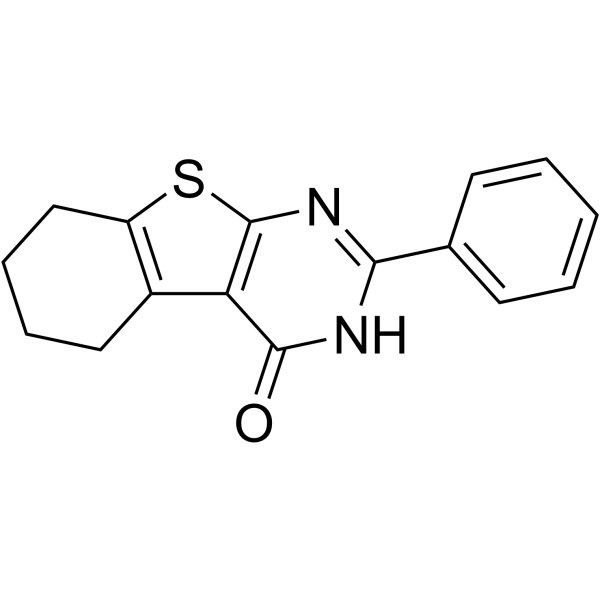
-
- HY-139662
-
|
|
E1/E2/E3 Enzyme
|
Cancer
|
|
HB007 is a small ubiquitin-related modifier 1 (SUMO1) degrader. HB007 induces ubiquitination and degradation of SUMO1, resulting in reduced tumor growth in vivo. HB007 can be used for the research of brain, breast, colon, and lung cancers .
|
-
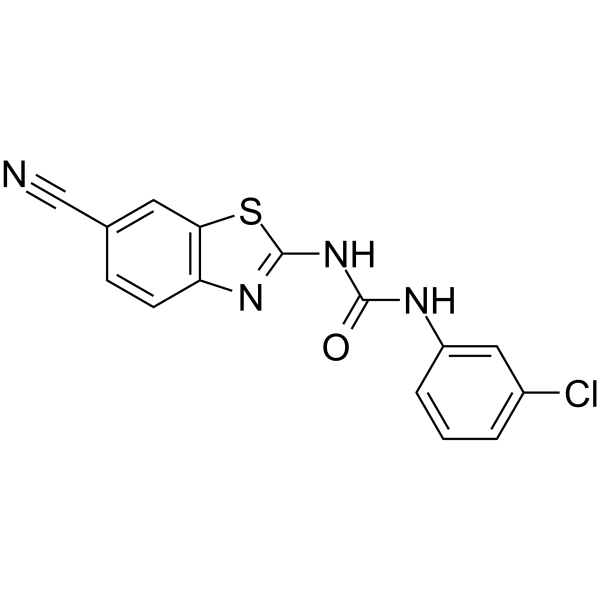
-
- HY-153863
-
|
|
MEK
|
Cancer
|
MS934 is a novel improved VHL-recruiting MEK 1/2 degrader. MS934 has anti-proliferation potency at inhibiting the growth of HT-29 cells with a GI50 value of 0.023 μM. MS934 can be used for the research of variety of human cancers, such as melanoma, nonsmall cell lung cancer (NSCLC), colorectal cancer, primary brain tumors, and hepatocellular carcinoma .
|
-
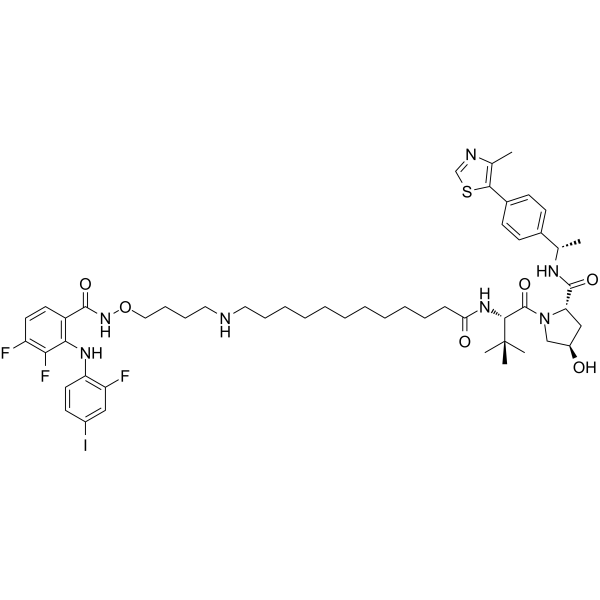
-
- HY-139300A
-
|
HMPL-813 succinate
|
EGFR
|
Cancer
|
|
Epitinib succinate is an orally active and selective epidermal growth factor receptor tyrosine kinase inhibitor (EGFR-TKI) designed for optimal brain penetration. Epitinib succinate can be used for the research of cancer . Epitinib (succinate) is a click chemistry reagent, it contains an Alkyne group and can undergo copper-catalyzed azide-alkyne cycloaddition (CuAAc) with molecules containing Azide groups.
|
-
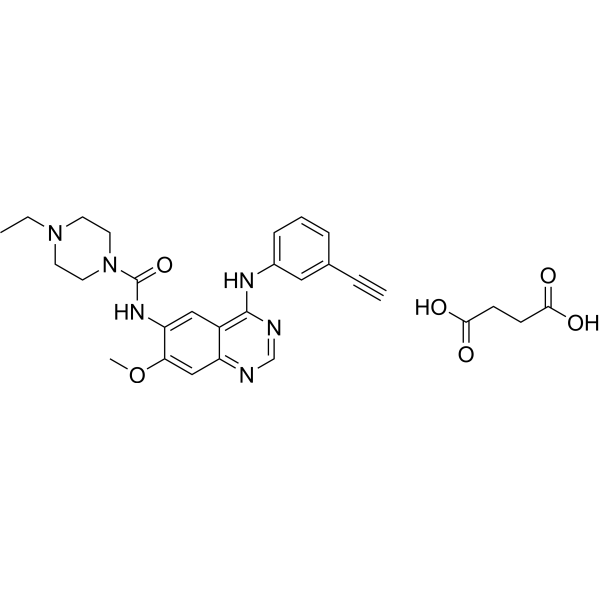
-
- HY-139300
-
|
HMPL-813
|
EGFR
|
Cancer
|
|
Epitinib is an orally active and selective epidermal growth factor receptor tyrosine kinase inhibitor (EGFR-TKI) designed for optimal brain penetration. Epitinib can be used for the research of cancer . Epitinib is a click chemistry reagent, it contains an Alkyne group and can undergo copper-catalyzed azide-alkyne cycloaddition (CuAAc) with molecules containing Azide groups.
|
-
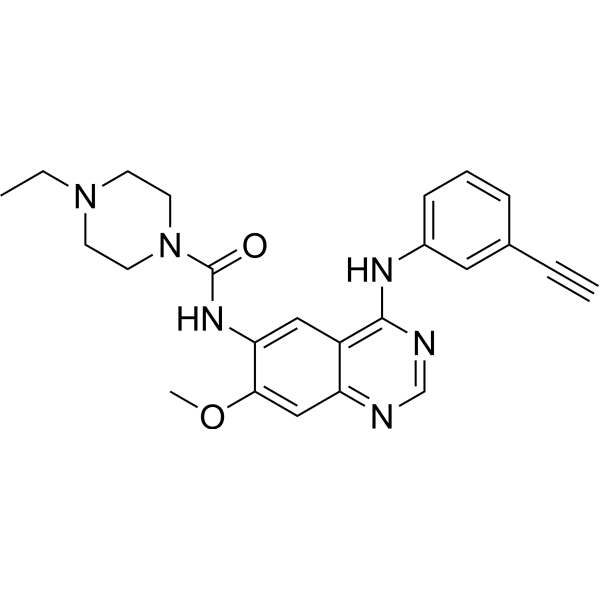
-
- HY-126899
-
|
|
Microtubule/Tubulin
|
Cancer
|
|
TPI-287, a blood-brain barrier-permeable microtubule stabilizer, can significantly reduce metastatic colonization of breast cancer in the brain .
|
-
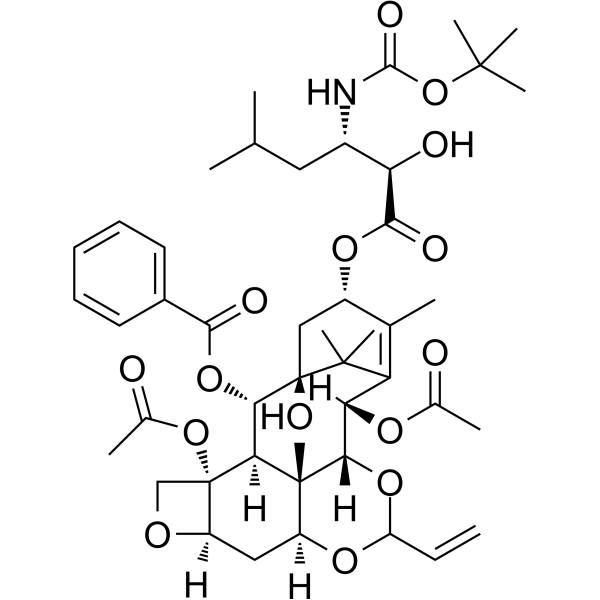
-
- HY-50879
-
|
GF120918; GW0918; GG918; GW120918
|
P-glycoprotein
BCRP
|
Cancer
|
|
Elacridar is an orally active P-glycoprotein (Pgp) and breast cancer resistance protein (BCRP) inhibitor. Elacridar can be used to examine the influence of efflux transporters on agent distribution to brain and the research of cancer .
|
-
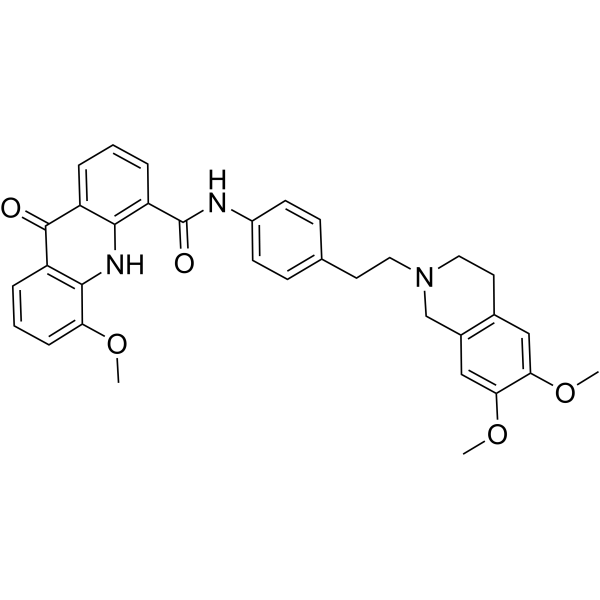
-
- HY-P10255
-
|
|
Potassium Channel
|
Cancer
|
|
K90-114TAT is an inhibitor for EAG2-Kvβ2 interaction, and exhibits antitumor efficacy against glioblastomas .
|
-
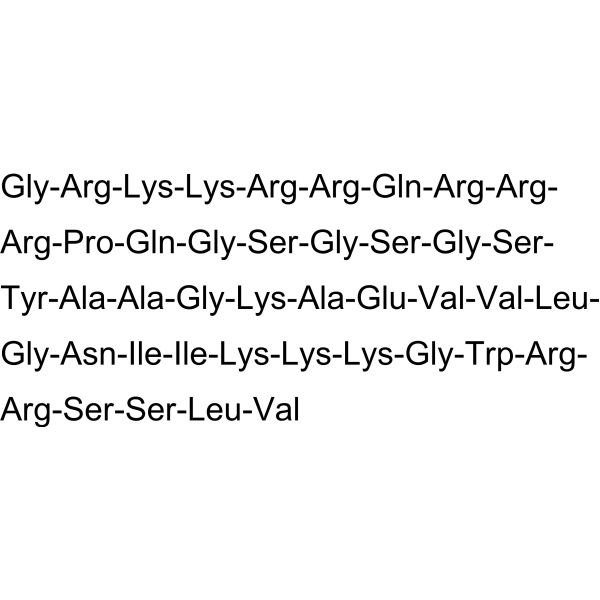
-
- HY-N2080
-
|
|
GABA Receptor
|
Cancer
|
|
Songorine is a diterpenoid alkaloid isolated from the genus Aconitum. Songorine is a GABAA receptor antagonist in rat brain and has anti cancer, antiarrhythmic and anti-inflammatory activities. Songorine has the potential for the treatment of Epithelial ovarian cancer (EOC) .
|
-
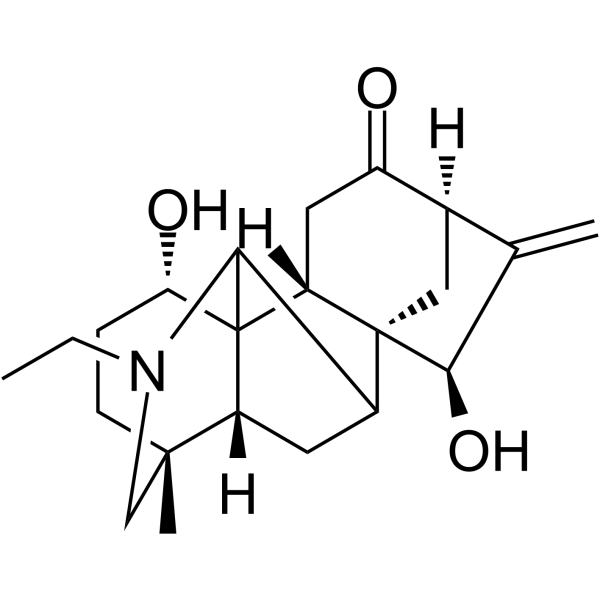
-
- HY-50880
-
|
GF120918A
|
P-glycoprotein
BCRP
|
Cancer
|
|
Elacridar hydrochloride (GF120918A) is an orally active P-glycoprotein (P-gp) and breast cancer resistance protein (BCRP) inhibitor. Elacridar hydrochloride can be used to examine the influence of efflux transporters on agent distribution to brain and it can be used for the research of cancer .
|
-
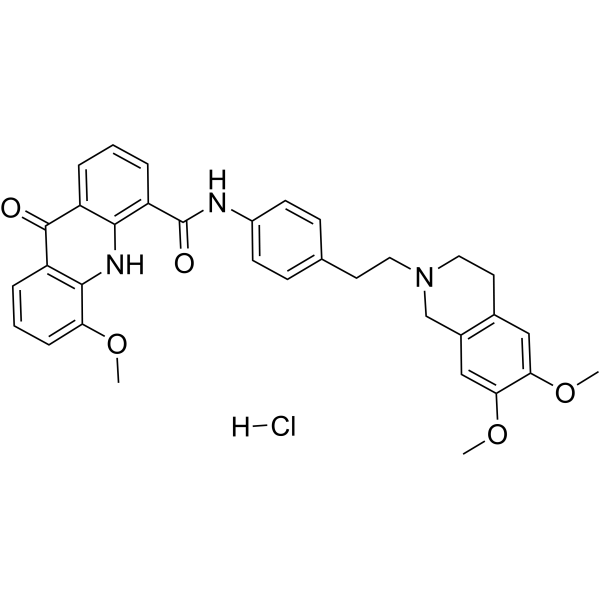
-
- HY-154959
-
|
|
Ras
|
Cancer
|
|
AZD4747 is a selective, blood-brain barrier-permeable mutant GTPase KRAS G12C inhibitor. AZD4747 has the potential to study cancer .
|
-
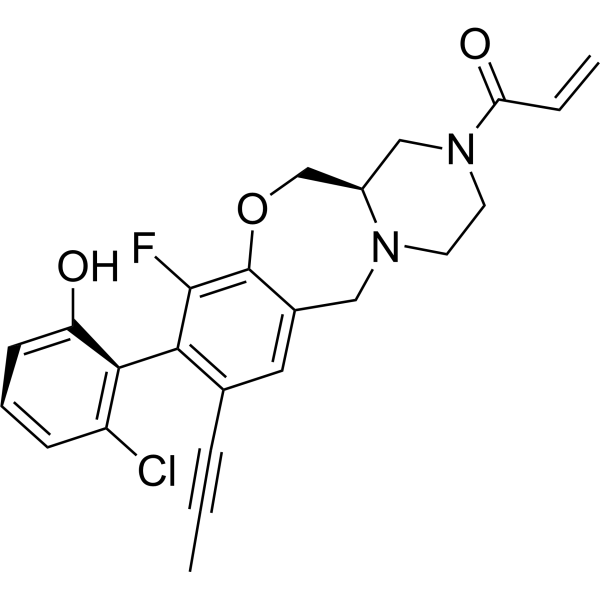
-
- HY-148419
-
|
|
Histone Methyltransferase
|
Cancer
|
|
TNG908 is a MTAP synergistic PRMT5 inhibitor. TNG908 crosses the blood-brain barrier and is orally active. TNG908 could be used in cancer research .
|
-
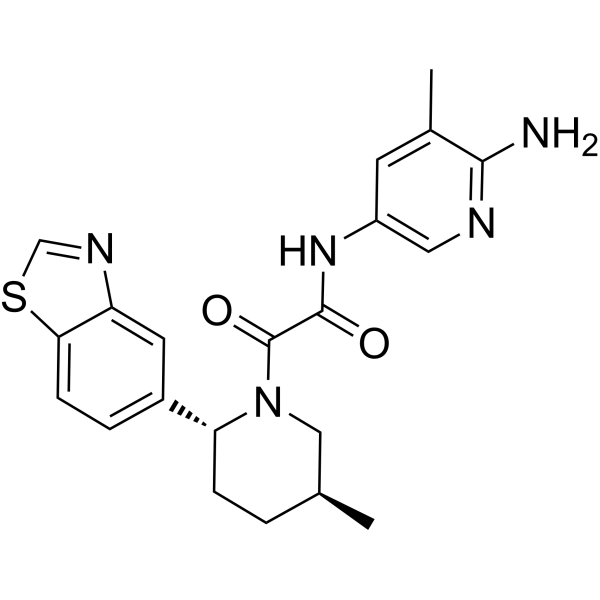
-
- HY-P99849
-
|
ABT-806
|
EGFR
|
Cancer
|
|
Depatuxizumab is a brain-penetrant and humanized tumor-specific anti EGFR monoclonal antibody. Depatuxizumab inhibits the growth of xenograft models of mutant EGFRvIII and wild-type EGFR. Depatuxizumab can be used for research on cancer .
|
-

-
- HY-134990
-
|
|
Apoptosis
|
Cancer
|
|
Hematoporphyrin monomethyl ether, second generation of porphyrin-related photosensitizer, is characterized by its single form, high yield of singlet oxygen, high selectivity, and low toxicity, which has been widely used in the diagnosis and research of various tumors, including lung cancer, bladder cancer, and nevus flammeus and brain glioma .
|
-
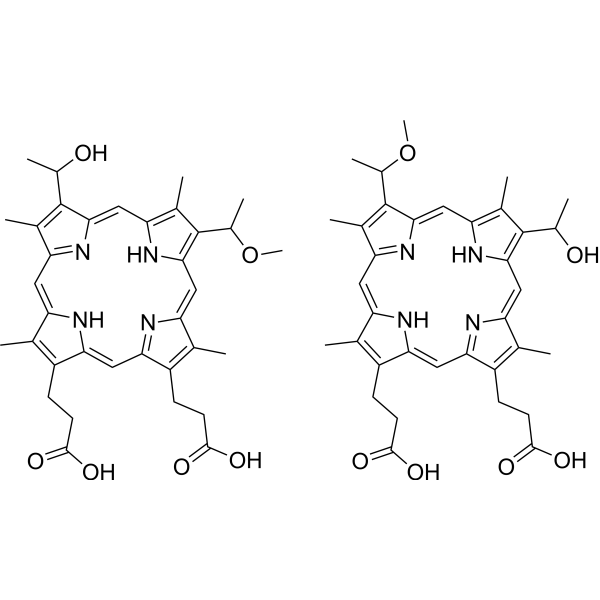
-
- HY-109061
-
|
YH25448; GNS-1480
|
EGFR
|
Cancer
|
|
Lazertinib (YH25448) is a potent, highly mutant-selective, blood-brain barrier permeable, orally available and irreversible third-generation EGFR tyrosine kinase inhibitor, and can be used in the research of non-small cell lung cancer .
|
-
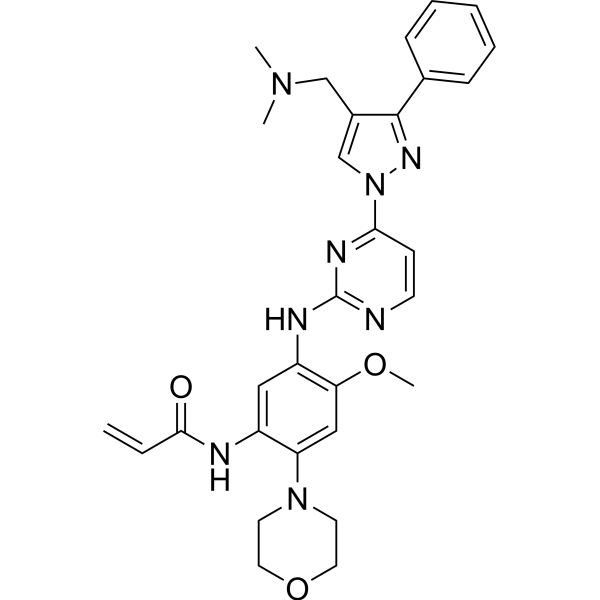
-
- HY-W016586
-
|
AT-125; U-42126
|
Parasite
|
Infection
Cancer
|
|
Acivicin (AT-125), a natural product produced by Streptomyces sviceus is a γ-glutamyl transpeptidase (GGT) inhibitor. Acivicin can across the blood-brain barrier and has anti-cancer, anti-parasitic properties .
|
-
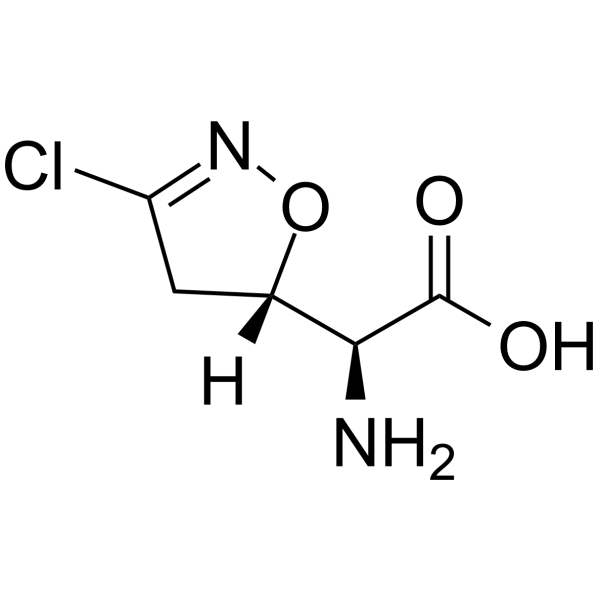
-
- HY-W016586A
-
|
AT-125 hydrochloride; U-42126 hydrochloride
|
Parasite
|
Infection
Cancer
|
|
Acivicin hydrochloride (AT-125 hydrochloride), a natural product produced by Streptomyces sviceus, is a γ-glutamyl transpeptidase (GGT) inhibitor. Acivicin hydrochloride can across the blood-brain barrier and has anti-cancer, anti-parasitic properties .
|
-
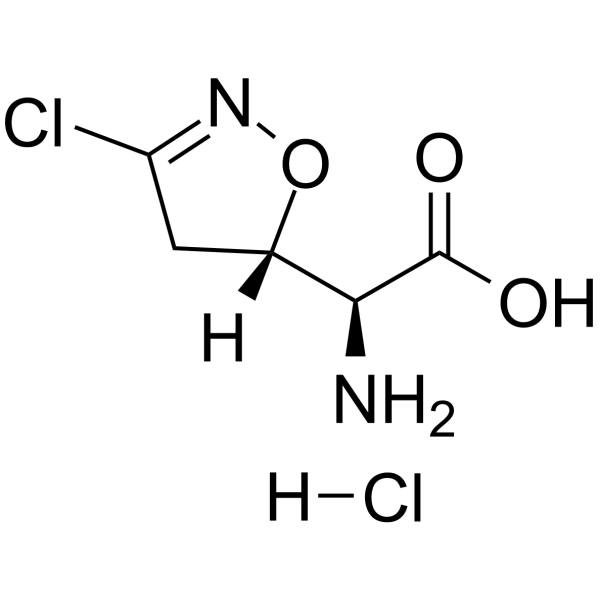
-
- HY-161117
-
|
|
Others
|
Cancer
|
|
AD-8007 is an acetyl CoA synthase 2 (ACSS2) inhibitor that can cross the blood-brain barrier. AD-8007 can significantly reduce lipid storage and cell colony formation in vitro models, and increase tumor cell death. AD-8007 has anti-cancer activity and can be used in the research of breast cancer .
|
-
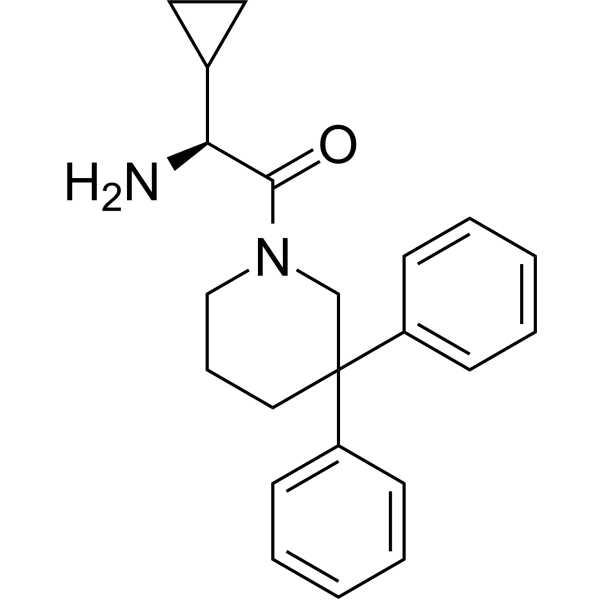
-
- HY-12098
-
|
MPC-6827 hydrochloride
|
Microtubule/Tubulin
|
Cancer
|
|
Verubulin hydrochloride (MPC-6827 hydrochloride) is a blood brain barrier permeable microtubule-disrupting agent, with potent and broad-spectrum in vitro and in vivo cytotoxic activities. Verubulin hydrochloride (MPC-6827 hydrochloride) exhibits potent anticancer activity in human MX-1 breast and other mouse xenograft cancer models. Verubulin hydrochloride (MPC 6827 hydrochloride) is a promising candidate for the treatment of multiple cancer types .
|
-
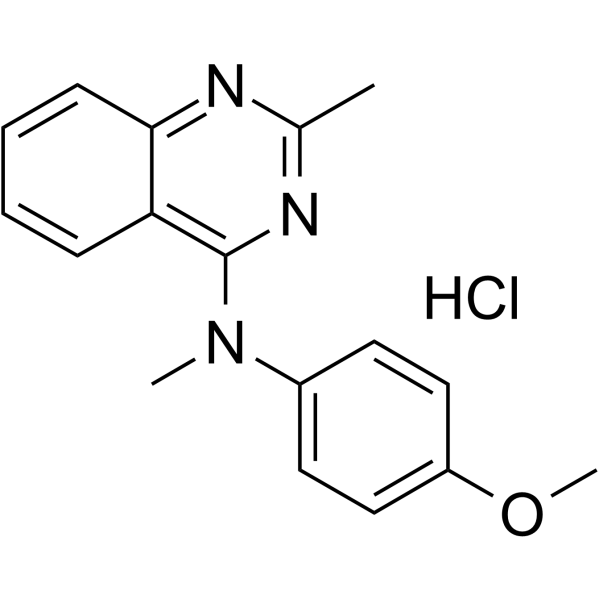
-
- HY-17423
-
|
|
HIV
Reverse Transcriptase
Telomerase
Apoptosis
|
Infection
Cancer
|
|
Abacavir is an orally active and competitive nucleoside reverse transcriptase inhibitor. Abacavir can inhibits the replication of HIV. Abacavir shows anticancer activity in prostate cancer cell lines. Abacavir can trespass the blood-brain-barrier and suppresses telomerase activity .
|
-
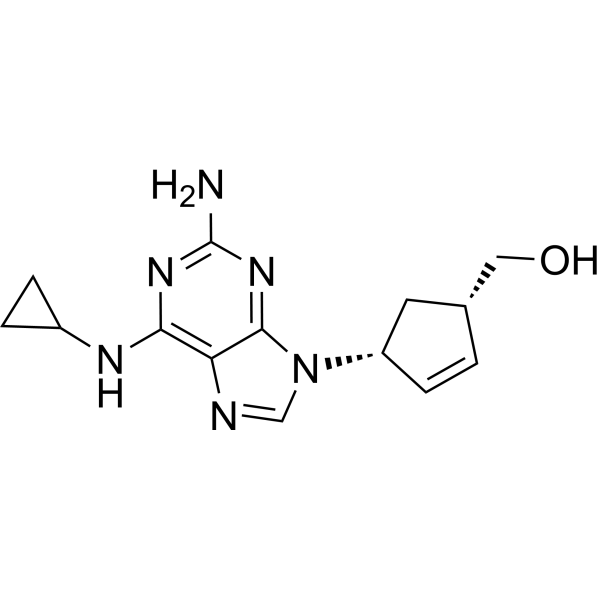
-
- HY-145778
-
|
|
Somatostatin Receptor
|
Neurological Disease
|
|
AGI-41998 is a potent inhibitor of methionine adenosyltransferase 2A (MAT2A). AGI-41998 is a brain-penetrant compound. AGI-41998 has the potential for exploring the effects of SAM modulation in the central nervous system (CNS) and research of cancer disease .
|
-
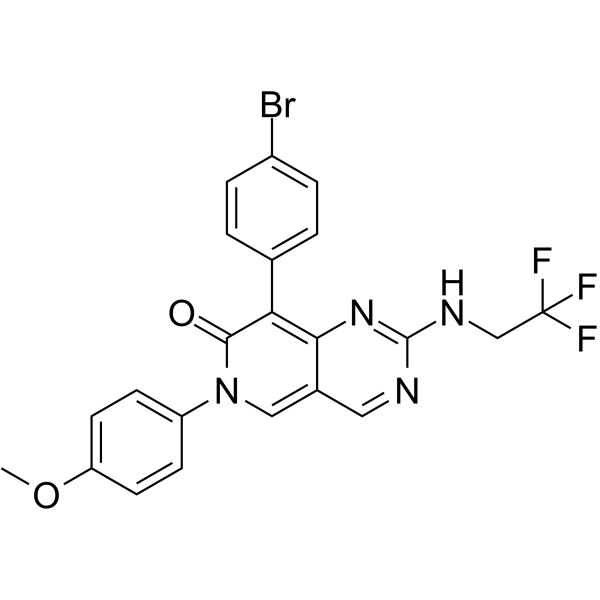
-
- HY-17423E
-
|
|
HIV
Apoptosis
Reverse Transcriptase
Telomerase
|
Infection
Cancer
|
|
Abacavir hydrochloride is a competitive, orally active nucleoside reverse transcriptase inhibitor. Abacavir hydrochloride can inhibits the replication of HIV. Abacavir hydrochloride shows anticancer activity in prostate cancer cell lines. Abacavir hydrochloride can trespass the blood-brain-barrier and suppresses telomerase activity .
|
-
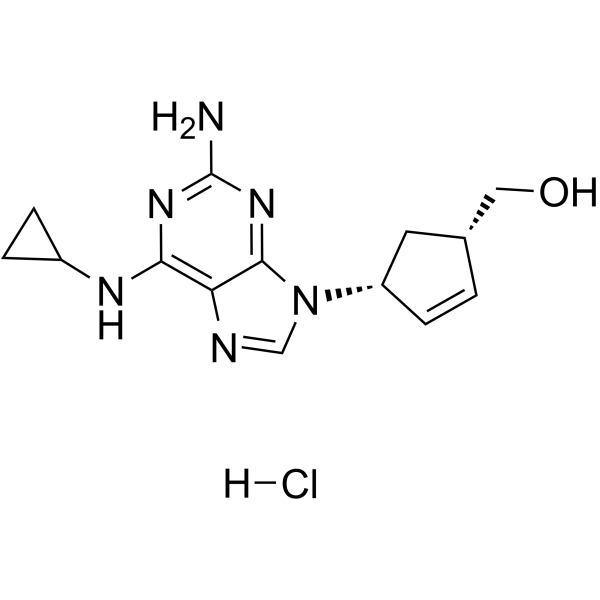
-
- HY-145804
-
|
|
PPAR
|
Neurological Disease
|
|
AZD-9574 is a potent and brain penetrant PARP1 inhibitor and shows >8000-fold selectivity for PARP1 compared to PARP2/3/5a/6. AZD-9574 acts by selectively inhibiting and trapping PARP1 at the sites of SSBs. AZD-9574 is an anti-cancer agent and can be used for HRD + breast cancer and advanced solid malignancies research .
|
-
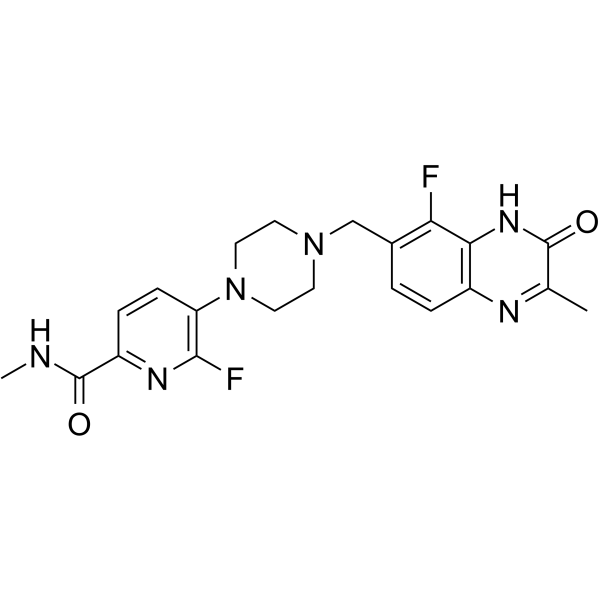
-
- HY-145777
-
|
|
Somatostatin Receptor
|
Neurological Disease
Cancer
|
|
AGI-43192 is a potent inhibitor of methionine adenosyltransferase 2A (MAT2A). AGI-43192 is a potent, but limited brain-penetrant compound. AGI-43192 has the potential for exploring the effects of SAM modulation in the central nervous system (CNS) and research of cancer disease .
|
-
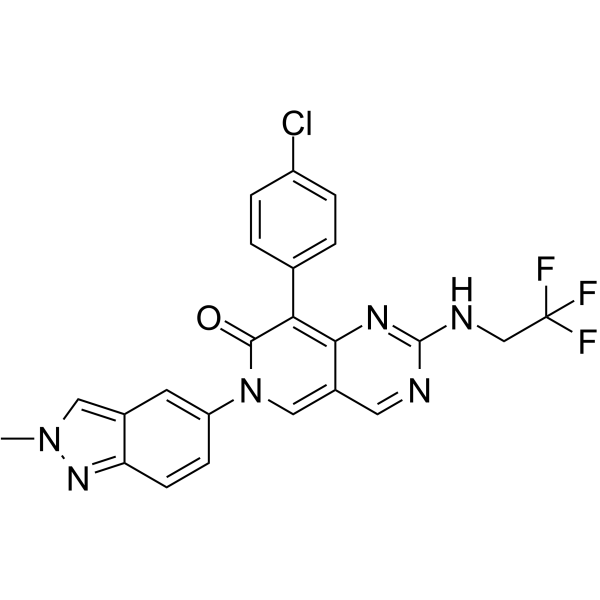
-
- HY-108616
-
|
|
Phospholipase
|
Cancer
|
|
VU 0364739 hydrochloride is a highly selective phospholipase D2 (PLD2) inhibitor with IC50s of 20 and 1500 nM for PLD2 and PLD1, respectively. VU 0364739 hydrochloride induces apoptosis and it can be used for cancer research .
|
-
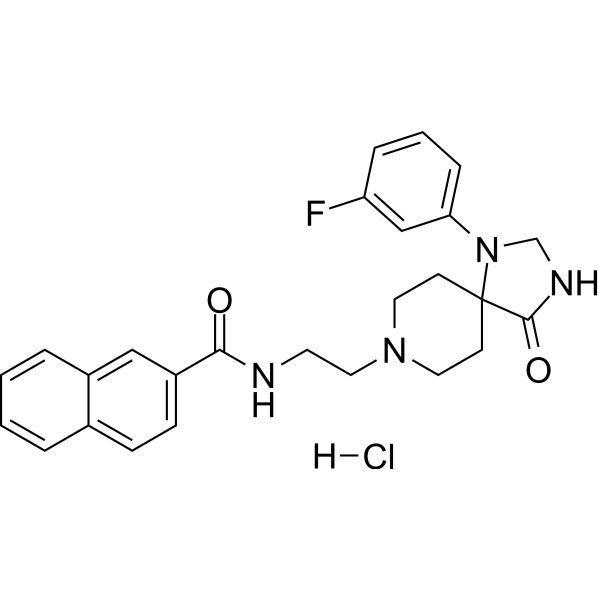
-
- HY-101478
-
|
|
mGluR
Apoptosis
|
Neurological Disease
Cancer
|
|
Fenobam is a selective and orally active mGluR5 antagonist (IC50=84 nM) that can penetrate the blood-brain barrier. Fenobam shows the Kd values of 54 nM and 31 nM on rat and human recombinant mGlu5 receptors, respectively. Fenobam has anxiolytic activity, inhibits self-administration behavior in mice, and induces apoptosis in cancer cells. Fenobam can be used for research on neurological diseases, cancer and drug addiction .
|
-
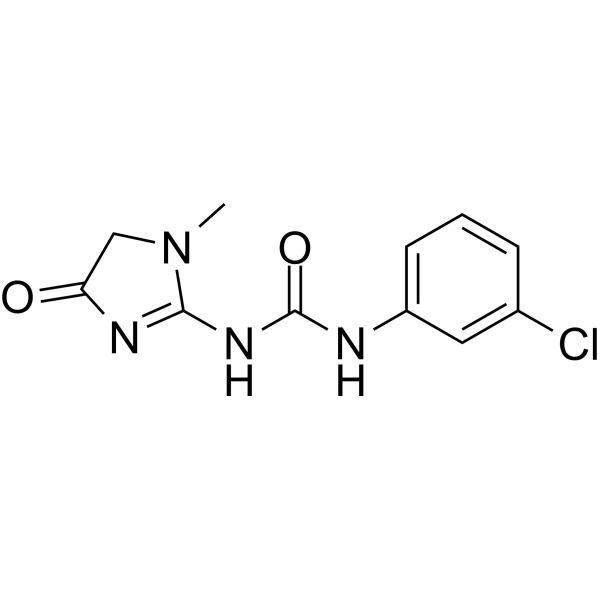
-
- HY-101478A
-
|
|
mGluR
Apoptosis
|
Neurological Disease
Cancer
|
|
Fenobam hydrate is a selective and orally active mGluR5 antagonist (IC50=84 nM) that can penetrate the blood-brain barrier. Fenobam hydrate shows the Kd values of 54 nM and 31 nM on rat and human recombinant mGlu5 receptors, respectively. Fenobam hydrate has anxiolytic activity, inhibits self-administration behavior in rat, and induces apoptosis in cancer cells. Fenobam hydrate can be used for research on neurological diseases, cancer and drug addiction .
|
-
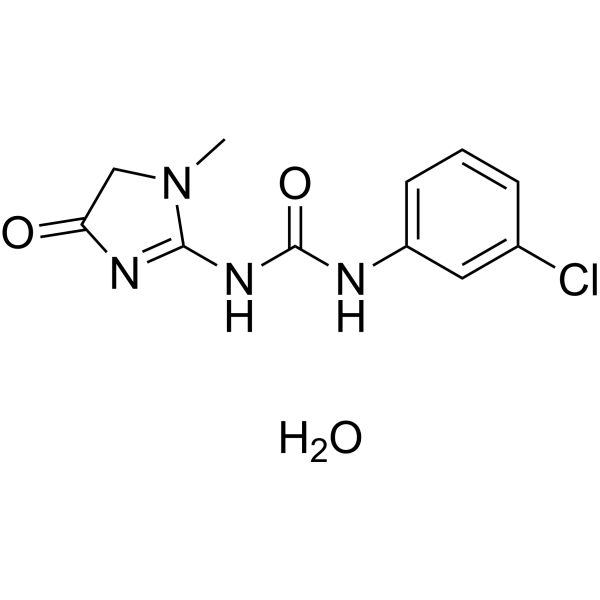
-
- HY-B0002A
-
|
GR 38032 hydrochloride dihydrate; SN 307 hydrochloride dihydrate
|
5-HT Receptor
|
Neurological Disease
|
|
Ondansetron (GR 38032) hydrochloride dehydrate is an orally active, highly selective and competitive 5-HT3 receptor antagonist (crosses the blood-brain barrier). Ondansetron hydrochloride dehydrate can be used in studies of preventing nausea and vomiting associated with cancer chemotherapy, radiation therapy and surgery .
|
-
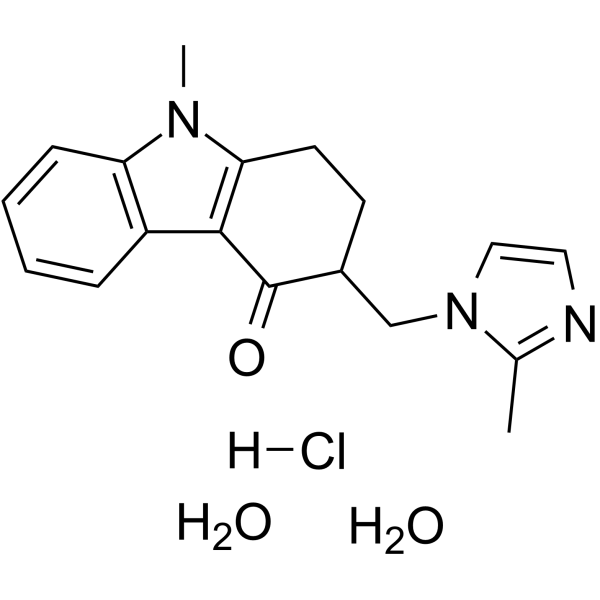
-
- HY-160168
-
-
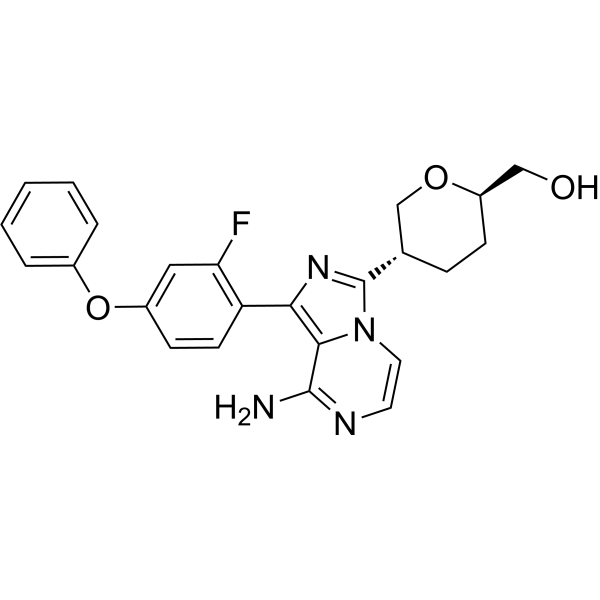
-
- HY-17423B
-
|
|
HIV
Reverse Transcriptase
Telomerase
Apoptosis
|
Infection
Cancer
|
|
Abacavir monosulfate is a competitive, orally active nucleoside reverse transcriptase inhibitor. Abacavir monosulfate can inhibits the replication of HIV. Abacavir monosulfate shows anticancer activity in prostate cancer cell lines. Abacavir monosulfate can trespass the blood-brain-barrier and suppresses telomerase activity .
|
-
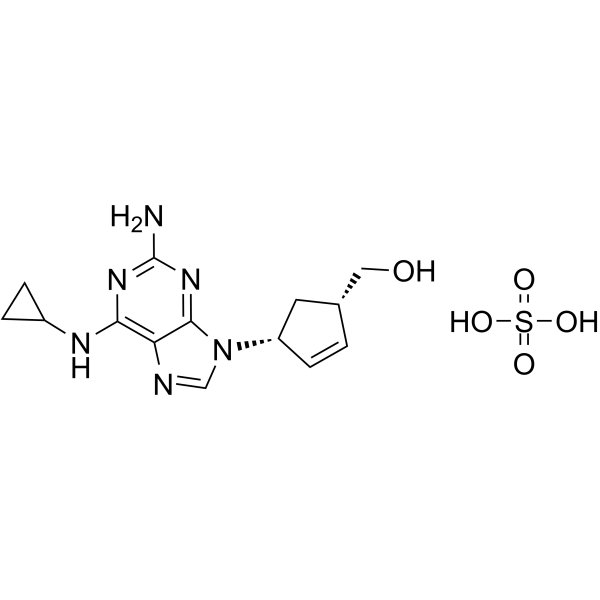
-
- HY-154959A
-
|
|
Others
|
Cancer
|
|
(9R,12aR)-AZD4747 is a diastereomer of AZD4747 (HY-154959). AZD4747 is a selective mutant GTPase KRAS G12C inhibitor with blood-brain barrier permeability. AZD4747 has the potential to study cancer .
|
-
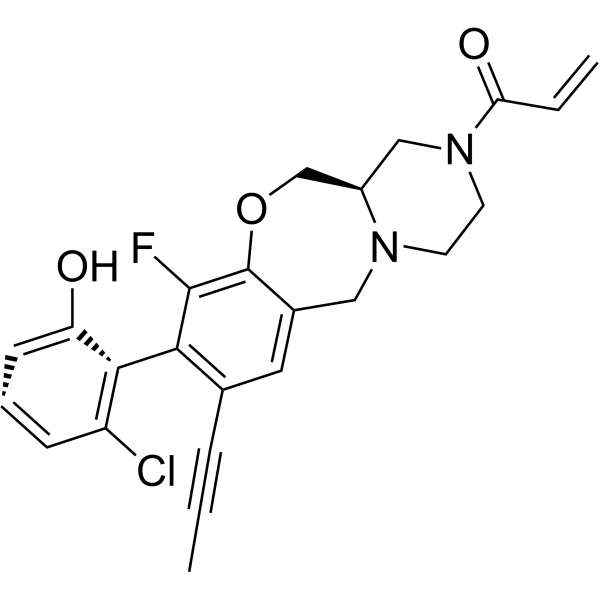
-
- HY-17423A
-
|
Abacavir Hemisulfate; ABC sulfate
|
Reverse Transcriptase
HIV
Telomerase
Apoptosis
|
Infection
|
|
Abacavir sulfate (Abacavir Hemisulfate) is a competitive, orally active nucleoside reverse transcriptase inhibitor. Abacavir sulfate can inhibits the replication of HIV. Abacavir sulfate shows anticancer activity in prostate cancer cell lines. Abacavir sulfate can trespass the blood-brain-barrier and suppresses telomerase activity .
|
-
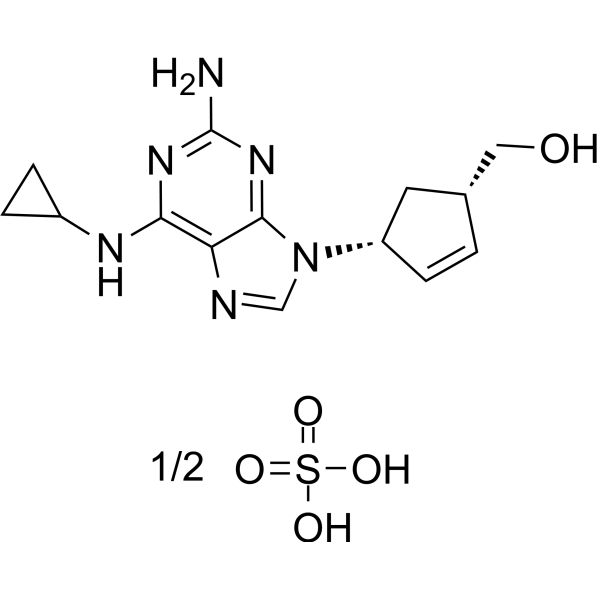
-
- HY-151808
-
|
|
Btk
|
Cancer
|
|
JS25 is a selective and covalent inhibitor of BTK that inactivates BTK with an IC50 value of 5.8 nM by chelating Tyr551. JS25 inhibits cancer cells proliferation, pronounces cell death, and promotes murine xenograft model of Burkitt’s lymphoma. JS25 effectively crosses the blood-brain barrier .
|
-
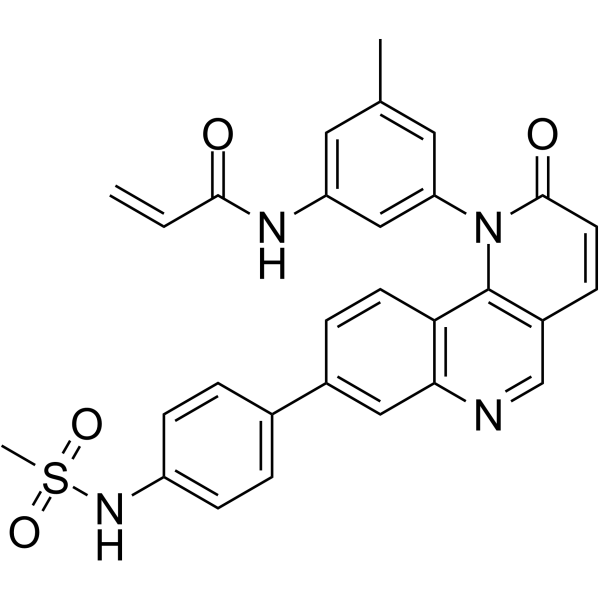
-
- HY-17363
-
-
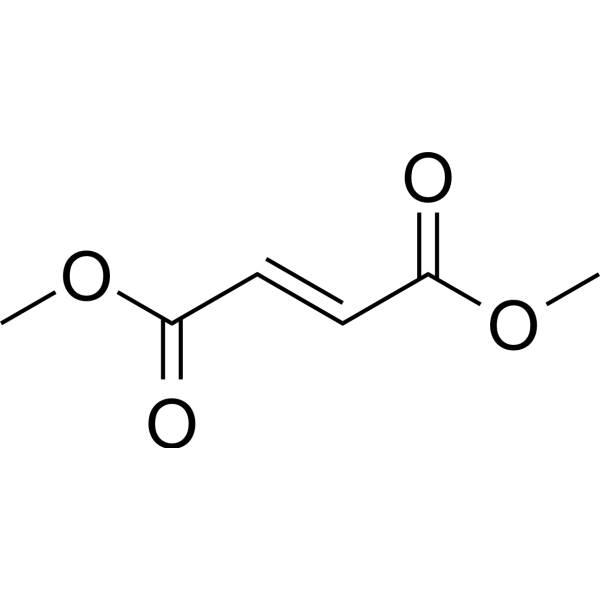
-
- HY-B1334A
-
|
|
Mitochondrial Metabolism
Apoptosis
|
Cardiovascular Disease
Cancer
|
|
Perhexiline maleate is an orally active CPT1 and CPT2 inhibitor that reduces fatty acid metabolism. Perhexiline maleate induces mitochondrial dysfunction and apoptosis in hepatic cells. Perhexiline maleate can cross the blood brain barrier (BBB) and shows anti-tumor activity. Perhexiline maleate can be used in the research of cancers, and cardiovascular disease like angina .
|
-
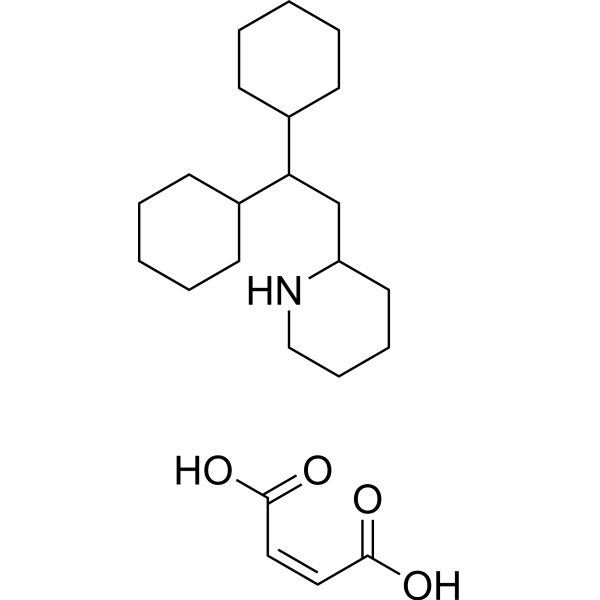
-
- HY-104044
-
|
BGB-290
|
PARP
|
Cancer
|
|
Pamiparib (BGB-290) is an orally active, potent, highly selective PARP inhibitor, with IC50 values of 0.9 nM and 0.5 nM for PARP1 and PARP2, respectively. Pamiparib has potent PARP trapping, and capability to penetrate the brain, and can be used for the research of various cancers including the solid tumor .
|
-
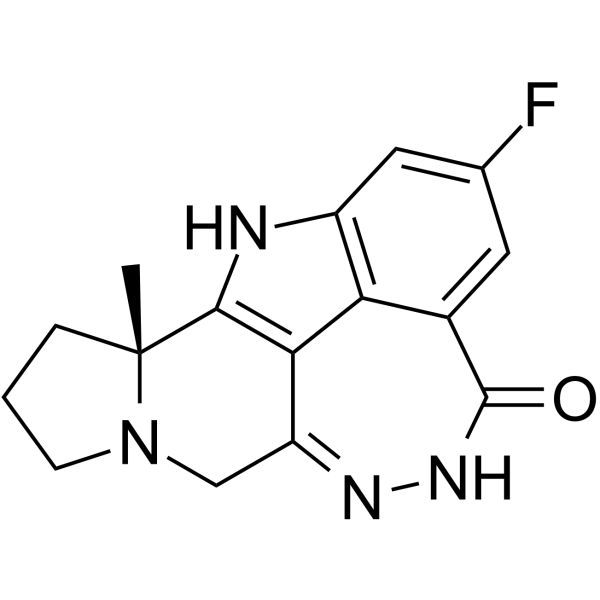
-
- HY-120574
-
|
|
ADC Cytotoxin
Topoisomerase
|
Cancer
|
|
TH1338 (compound 3b), an orally active camptothecin derivative and a potent chemotherapeutic agent for cancer, demonstrates excellent cytotoxic potency against human tumor cell lines in vitro. TH1338 (compound 3b) possesses significant brain penetration, favorable efflux pump properties, and hematological toxicity profile .
|
-
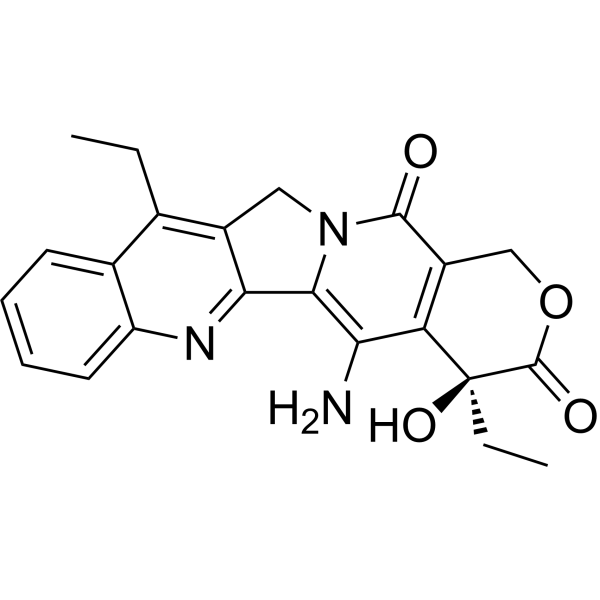
-
- HY-B1334
-
|
|
Mitochondrial Metabolism
Apoptosis
|
Cardiovascular Disease
Cancer
|
|
Perhexiline is an orally active CPT1 and CPT2 inhibitor that reduces fatty acid metabolism. Perhexiline induces mitochondrial dysfunction and apoptosis in hepatic cells. Perhexiline can cross the blood brain barrier (BBB) and shows anti-tumor activity. Perhexiline can be used in the research of cancers, and cardiovascular disease like angina .
|
-
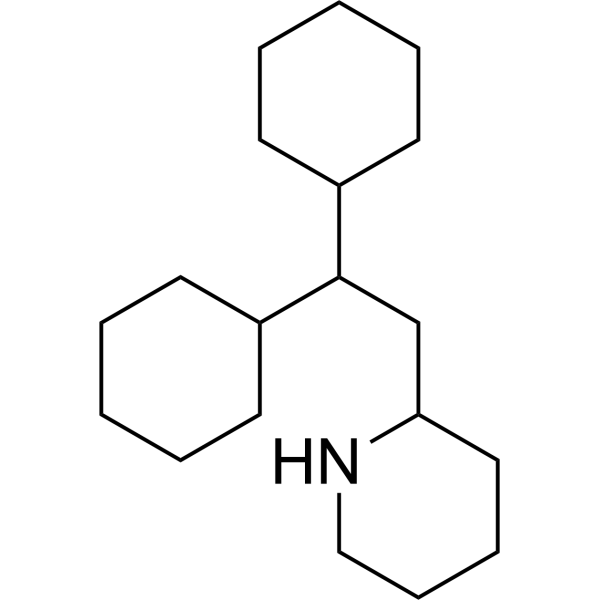
-
- HY-17412S1
-
|
|
Isotope-Labeled Compounds
|
Infection
Neurological Disease
Inflammation/Immunology
Cancer
|
|
Minocycline-d6 sulfate is deuterated labeled Minocycline (HY-17412A). Minocycline is an orally effective semi-synthetic tetracycline antibiotic and HIF-1α inhibitor that can penetrate the blood-brain barrier. Minocycline has bacteriostatic, anti-cancer, anti-inflammatory, neuroprotective properties and antidepressant effects.
|
-
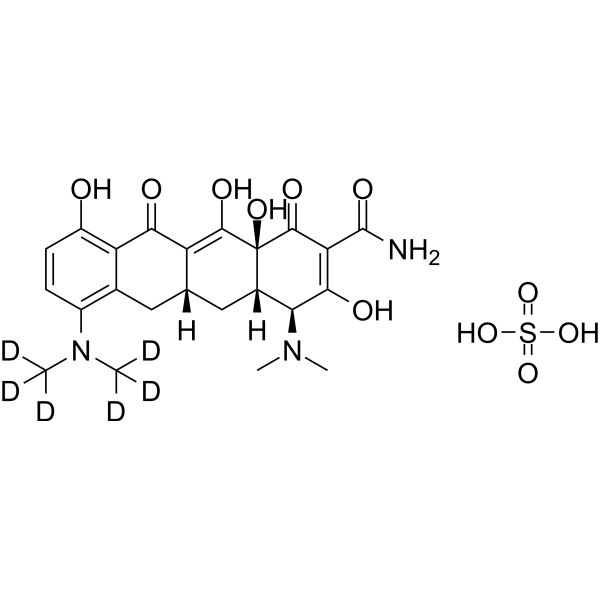
-
- HY-115925
-
|
|
SHP2
Phosphatase
|
Cancer
|
|
SHP2-IN-9 is a specific SHP2 inhibitor (IC50 =1.174 μM) with enhanced blood–brain barrier penetration. SHP2-IN-9 shows 85-fold more selective for SHP2 than SHP1. SHP2-IN-9 inhibits SHP2-mediated cell signal transduction and cancer cell proliferation, and inhibits the growth of cervix cancer tumors and glioblastoma growth in vivo .
|
-
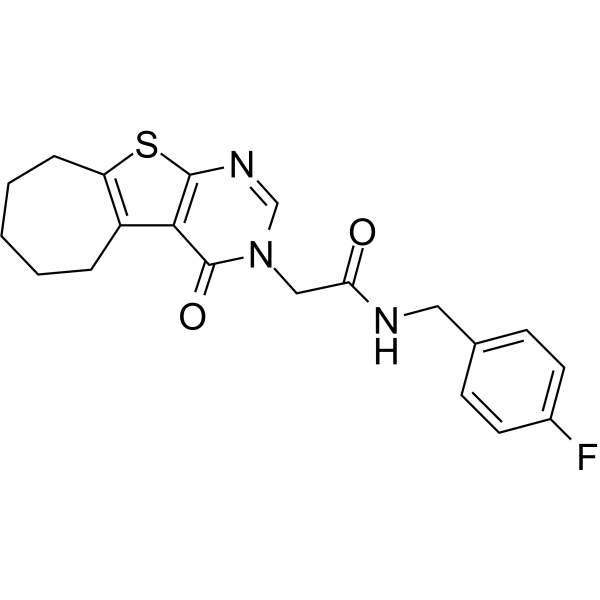
-
- HY-N12834
-
|
|
Others
|
Inflammation/Immunology
Cancer
|
|
Ecdysoside B (compound 6b) is a pregnanoside compound isolated from the plant Ecdysanthera rosea. Ecdysoside B and its derivatives and isomers shows anticancer, immunosuppressive and anti-inflammatory activities. Ecdysoside B shows cytotoxicity to a variety of human tumor cell lines, including PANC-1 (human pancreatic cancer cells), A375 (human melanoma cells) and U87 (brain glioma U87 cells). Ecdysoside B can be used for research in the areas of cancer, immunomodulation and anti-inflammato .
|
-

-
- HY-112037
-
|
IACS-10759
|
Oxidative Phosphorylation
Mitochondrial Metabolism
Apoptosis
|
Cancer
|
|
IACS-010759 is an orally active, potent mitochondrial complex I of oxidative phosphorylation (OXPHOS) inhibitor. IACS-010759 inhibits proliferation and induces apoptosis in models of brain cancer and acute myeloid leukemia (AML) reliant on OXPHOS. IACS-010759 has the potential for relapsed/refractory AML and solid tumors research .
|
-
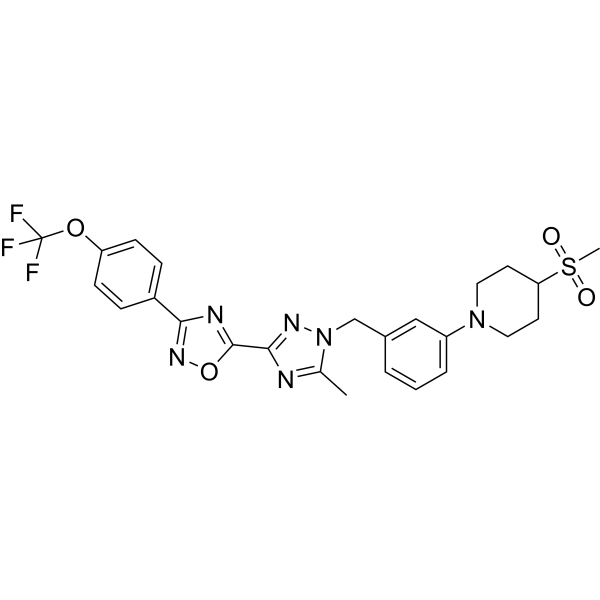
-
- HY-16531
-
YF-2
2 Publications Verification
|
Histone Acetyltransferase
|
Neurological Disease
Cancer
|
|
YF-2 is a highly selective, blood-brain-barrier permeable histone acetyltransferase activator, acetylates H3 in the hippocampus, with EC50s of 2.75 μM, 29.04 μM and 49.31 μM for CBP, PCAF, and GCN5, respectively, shows no effect on HDAC. Anti-cancer and anti-Alzheimer's disease .
|
-
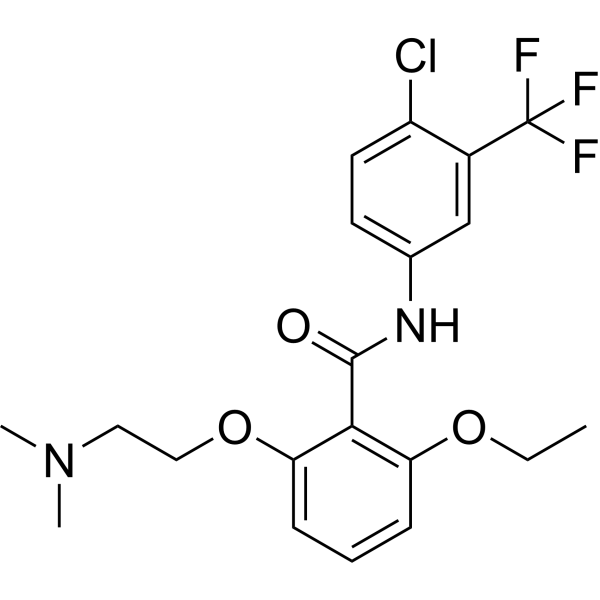
-
- HY-16531A
-
|
|
Histone Acetyltransferase
|
Neurological Disease
Cancer
|
|
YF-2 hydrochloride is a highly selective, blood-brain-barrier permeable histone acetyltransferase activator, acetylates H3 in the hippocampus, with EC50s of 2.75 μM, 29.04 μM and 49.31 μM for CBP, PCAF, and GCN5, respectively, shows no effect on HDAC. Anti-cancer and anti-Alzheimer's disease .
|
-
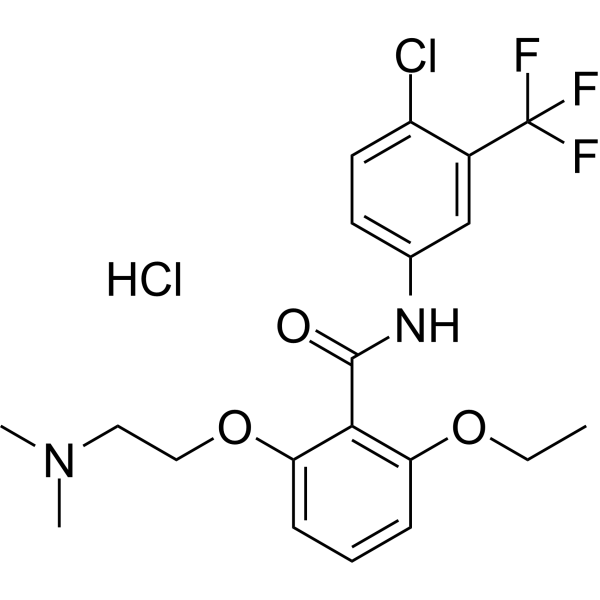
-
- HY-100501
-
|
MSC2363318A
|
Ribosomal S6 Kinase (RSK)
Akt
|
Cancer
|
|
M2698 (MSC2363318A) is an orally active, ATP competitive, selective p70S6K and Akt dual-inhibitor with IC50s of 1 nM for p70S6K, Akt1 and Akt3. M2698 can cross the blood-brain barrier and has anti-cancer activity .
|
-
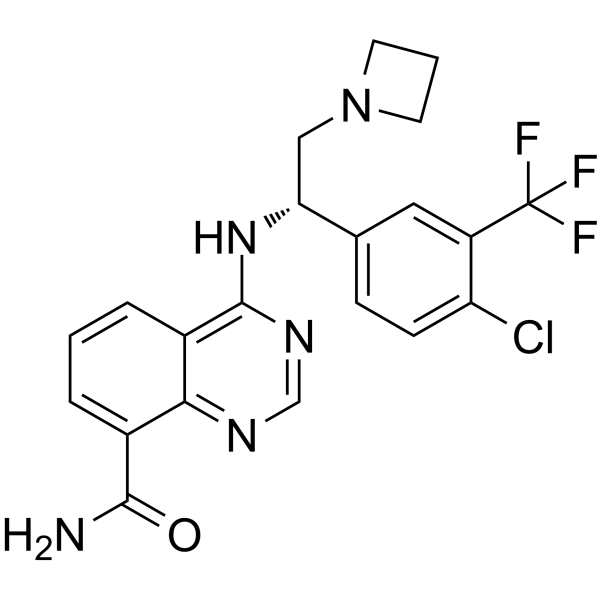
-
- HY-N3187
-
-
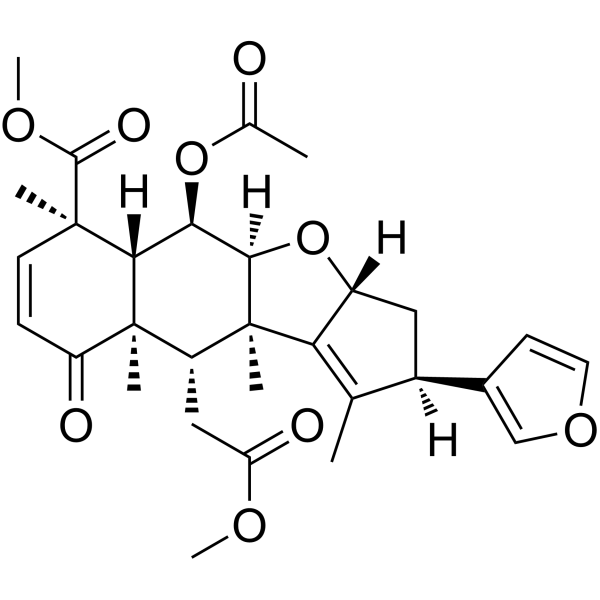
-
- HY-112037A
-
|
IACS-10759 hydrochloride
|
Oxidative Phosphorylation
Mitochondrial Metabolism
Apoptosis
|
Cancer
|
|
IACS-010759 hydrochlorideis an orally active, potent mitochondrial complex I of oxidative phosphorylation (OXPHOS) inhibitor. IACS-010759 hydrochlorideinhibits proliferation and induces apoptosis in models of brain cancer and acute myeloid leukemia (AML) reliant on OXPHOS. IACS-010759 hydrochloride has the potential for relapsed/refractory AML and solid tumors research .
|
-
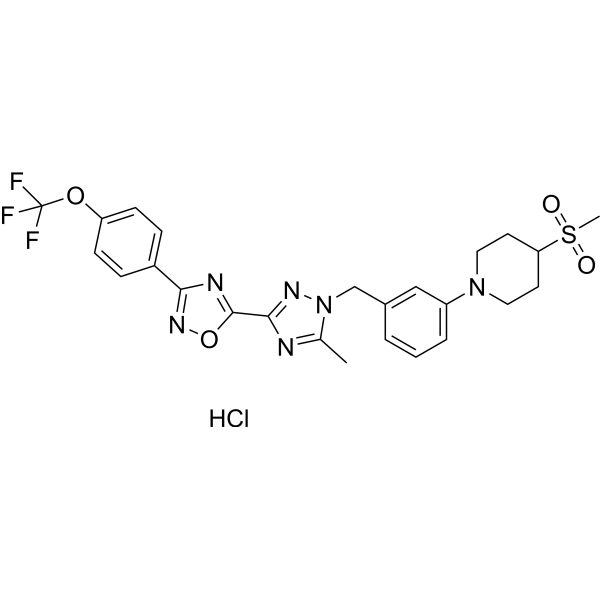
-
- HY-136731
-
|
|
DNA/RNA Synthesis
|
Cancer
|
|
APE1-IN-1 is a potent and blood-brain barrier (BBB) penetrant apurinic/apyrimidinic (AP) endonuclease 1 (APE1) inhibitor with an IC50 value of 2 μM. APE1-IN-1 can potentiate the cytotoxicity of the alkylating agents Methylmethane sulfonate and Temozolomide (HY-17364) to cancer cells .
|
-
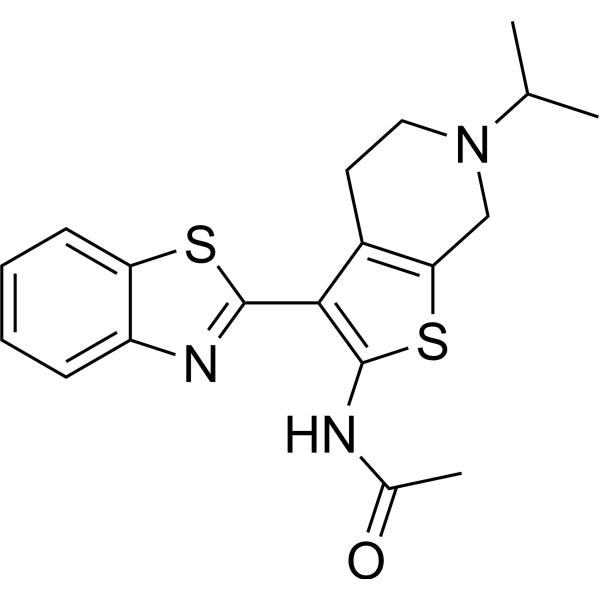
-
- HY-152292
-
|
NVL-520
|
ROS Kinase
|
Cancer
|
|
Zidesamtinib (NVL-520) is a potent, selective, orally active and brain-penetrant inhibitor of diverse ROS1 fusions and resistance mutations, with IC50s of 0.7 and 7.9 nM for wild-type ROS1 and ROS1 G2032R, respectively, and spares TRK inhibition. Zidesamtinib can be used for the research of cancer .
|
-
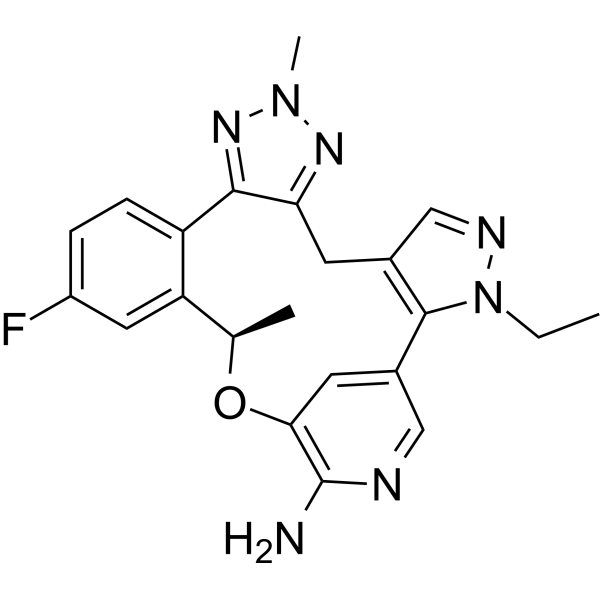
-
- HY-12768B
-
|
BLZ945 dihydrochloride
|
c-Fms
|
Neurological Disease
Cancer
|
|
Sotuletinib (BLZ945) dihydrochloride is an orally active and blood-brain barrier-permeable CSF1-R-specific inhibitor (IC50=1 nM). Sotuletinib (BLZ945) dihydrochloride induces tumor cell apoptosis and effectively inhibits tumor growth in mouse models. Sotuletinib dihydrochloride can be used in cancer and amyotrophic lateral sclerosis (ALS) research .
|
-
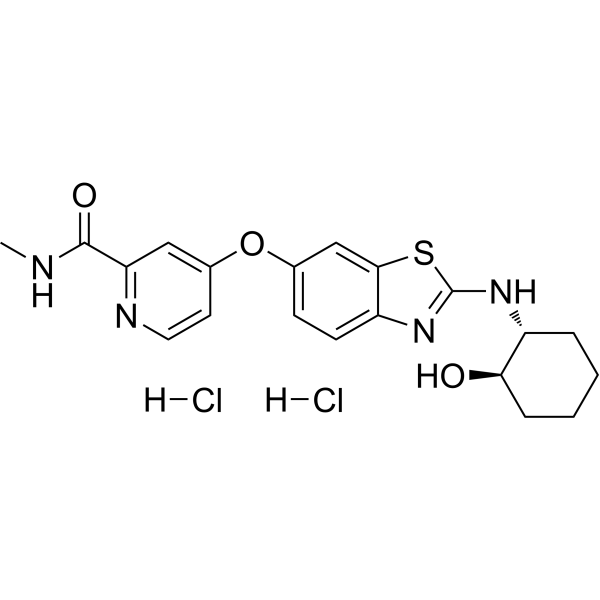
- HY-17423R
-
|
|
HIV
Reverse Transcriptase
Telomerase
Apoptosis
|
Infection
Cancer
|
|
Abacavir (Standard) is the analytical standard of Abacavir. This product is intended for research and analytical applications. Abacavir is an orally active and competitive nucleoside reverse transcriptase inhibitor. Abacavir can inhibits the replication of HIV. Abacavir shows anticancer activity in prostate cancer cell lines. Abacavir can trespass the blood-brain-barrier and suppresses telomerase activity .
|
-

- HY-B0364A
-
|
Dyclocaine hydrochloride
|
Bacterial
Fungal
Aldehyde Dehydrogenase (ALDH)
|
Infection
Cancer
|
|
Dyclonine (Dyclocaine) hydrochloride is an orally effective ALDH covalent inhibitor (crosses blood-brain barrier), with an IC50 of 35 µM for ALDH2 and 76 µM for ALDH3A1. Dyclonine hydrochloride has sensitizing activities for targeted cancer cells and antibacterial. Dyclonine hydrochloride is also a local anesthetic that blocks the transmission of various nerve impulses or stimuli and inhibits the sensation of touch and pain .
|
-
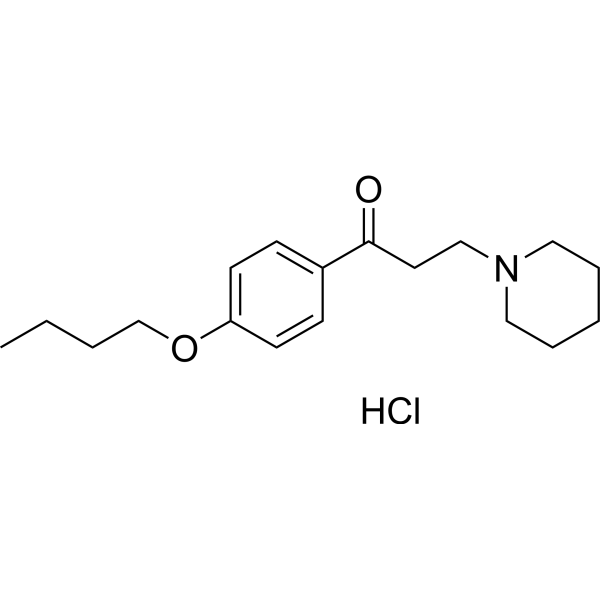
- HY-125374
-
|
XRP9881
|
Apoptosis
|
Cancer
|
|
Larotaxel (XRP9881) is a taxane analogue with preclinical activity against taxane-resistant breast cancer. Larotaxel (XRP9881) exerts its cytotoxic effect by promoting tubulin assembly and stabilizing microtubules, ultimately leading to cell death by apoptosis. It presents the ability to cross the blood brain barrier and has a much lower affinity for P-glycoprotein 1 than Docetaxel .
|
-
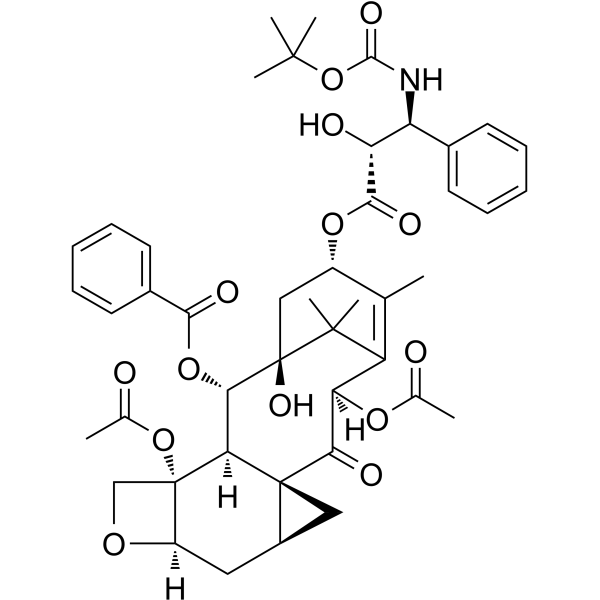
- HY-132242
-
|
SFN-NAC
|
HDAC
Apoptosis
Drug Metabolite
|
Cancer
|
|
DL-Sulforaphane N-acetyl-L-cysteine (SFN-NAC) is an orally active HDAC inhibitor and metabolite of sulforaphane (HY-13755) with longer half-life and better blood-brain barrier permeability. DL-Sulforaphane N-acetyl-L-cysteine activates autophagy-mediated downregulation of α-tubulin expression through the ERK pathway and can be used in cancer research .
|
-
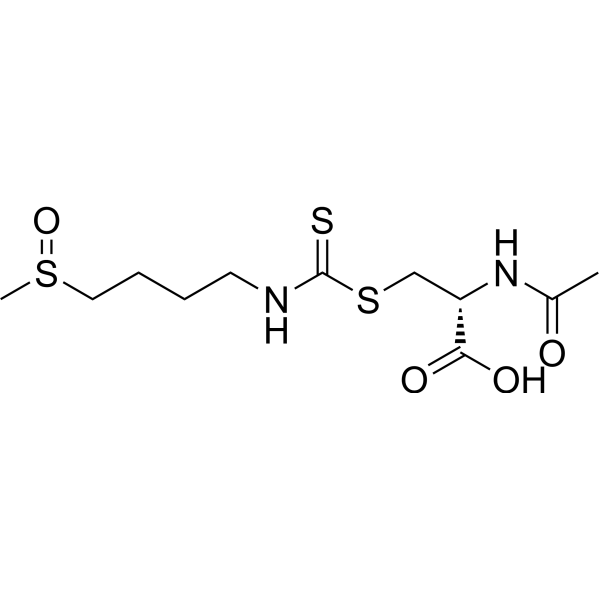
- HY-111193
-
|
3-Chloroprocainamide
|
NF-κB
Apoptosis
|
Cancer
|
|
Declopramide (3-Chloroprocainamide) is an orally active antitumor agent, which inhibits proliferation of cancer cells HL60 and K562, and inhibits tumor growth of human brain astrocytoma (T24) in mouse model. Declopramide induces apoptosis, inhibits NF-κB through inhibition of IκBα degradation. Declopramide serves also as chemosensitizer in research .
|
-

- HY-N6785A
-
|
|
Phosphatase
Apoptosis
|
Neurological Disease
Cancer
|
|
Okadaic acid sodium, a marine toxin, is an inhibitor of protein phosphatases (PP). Okadaic acid (sodium) has a significantly higher affinity for PP2A (IC50=0.1-0.3 nM), and inhibits PP1 (IC50=15-50 nM), PP3 (IC50=3.7-4 nM), PP4 (IC50=0.1 nM), PP5 (IC50=3.5 nM), but does not inhibit PP2C. Okadaic acid sodium increases of phosphorylation of a number of proteins by inhibiting PP, and acts a tumor promoter. Okadaic acid sodium induces tau phosphorylation .
|
-
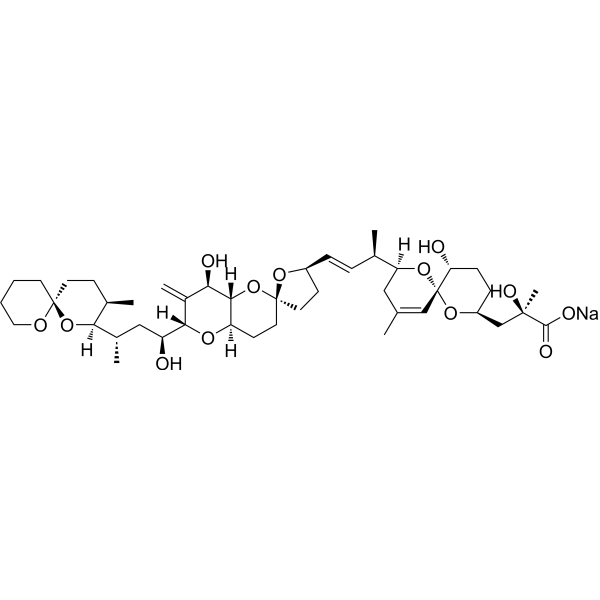
- HY-N2132
-
|
Flavokavain B
|
Apoptosis
|
Cancer
|
|
Flavokawain B (Flavokavain B) is a chalcone isolated from the root extracts of kava-kava plant and a potent apoptosis inducer for inhibiting the growth of various cancer cell lines. Flavokawain B (Flavokavain B) shows strong antiangiogenic activity. Flavokawain B (Flavokavain B) inhibits human brain endothelial cell (HUVEC) migration and tube formation with very low and non-toxic concentrations .
|
-
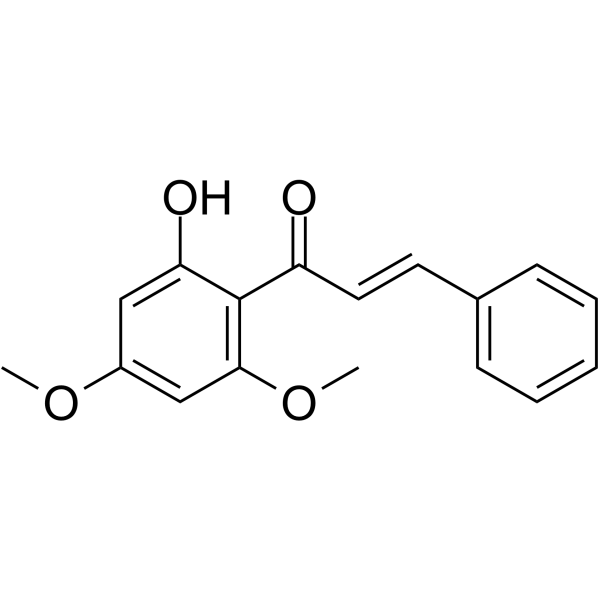
- HY-W010042
-
|
L-(-)-Glucose
|
Others
|
Metabolic Disease
Cancer
|
|
L-Glucose (L-(-)-Glucose) is a stereoisomer of D-Glucose (HY-B0389), which does not readily enter the brain. L-Glucose can promote food intake. L-glucose is combined with a fluorescence detector to produce a fluorescent probe that can be used to visualize and characterize cancer cells. L-Glucose also can be used in the research to enhance memory in mice .
|
-
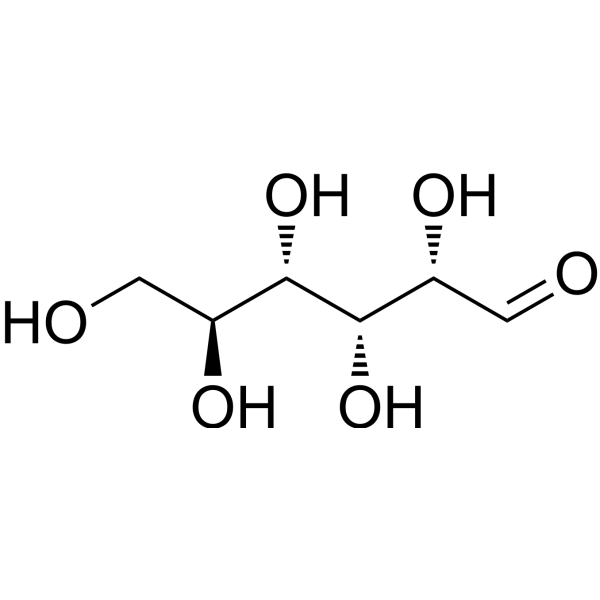
- HY-B0568
-
Deferiprone
Maximum Cited Publications
35 Publications Verification
|
Ferroptosis
HCV
Apoptosis
COX
|
Infection
Cardiovascular Disease
Neurological Disease
Inflammation/Immunology
Endocrinology
Cancer
|
|
Deferiprone is a potent, orally active, brain-penetrant, cell-penetrant, skin-permeable, free iron chelating agent. Deferiprone inhibits the proliferation and migration, and stimulates apoptosis in tumor cell. Deferiprone has antianemic, neuroprotective, anti-inflammatory, antioxidant, and antidotal activity. Deferiprone can be used in cancer, cardiovascular disease, infection, inflammation, and neurological disease study .
|
-
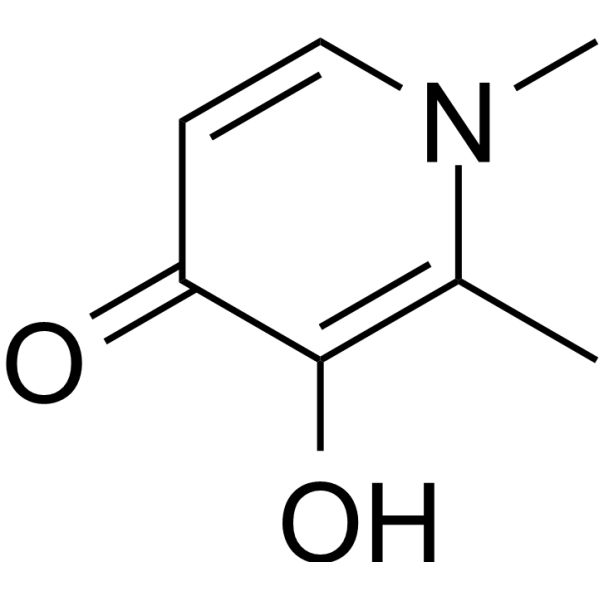
- HY-104044R
-
|
|
PARP
|
Cancer
|
|
Pamiparib (Standard) is the analytical standard of Pamiparib. This product is intended for research and analytical applications. Pamiparib (BGB-290) is an orally active, potent, highly selective PARP inhibitor, with IC50 values of 0.9 nM and 0.5 nM for PARP1 and PARP2, respectively. Pamiparib has potent PARP trapping, and capability to penetrate the brain, and can be used for the research of various cancers including the solid tumor .
|
-

- HY-17363R
-
|
|
Keap1-Nrf2
Reactive Oxygen Species
HIV
Autophagy
Endogenous Metabolite
|
Infection
Neurological Disease
Inflammation/Immunology
Cancer
|
|
Dimethyl fumarate (Standard) is the analytical standard of Dimethyl fumarate. This product is intended for research and analytical applications. Dimethyl fumarate (DMF) is an orally active and brain-penetrant Nrf2 activator and induces upregulation of antioxidant gene expression. Dimethyl fumarate induces necroptosis in colon cancer cells through GSH depletion/ROS increase/MAPKs activation pathway, and also induces cell autophagy. Dimethyl fumarate can be used for multiple sclerosis research .
|
-

- HY-150510
-
|
|
Histone Methyltransferase
|
Neurological Disease
Cancer
|
|
MS8511 is a selective G9a/GLP covalent irreversible inhibitor by targeting a cysteine residue at the substrate binding site, with IC50 values of 100 nM (G9a) and 140 nM (GLP), and Kd values of 44 nM (G9a) and 46 nM (GLP). MS8511 reduces the cellular H3K9me2 level and enhances antiproliferation activity. MS8511 can be used for the research of several types of cancers including brain, breast, ovarian, lung, bladder, melanoma, colorectal cancer, and other disease such as Alzheimer’s disease (AD), sickle cell disease, Prader−Willi syndrome (PWS) .
|
-
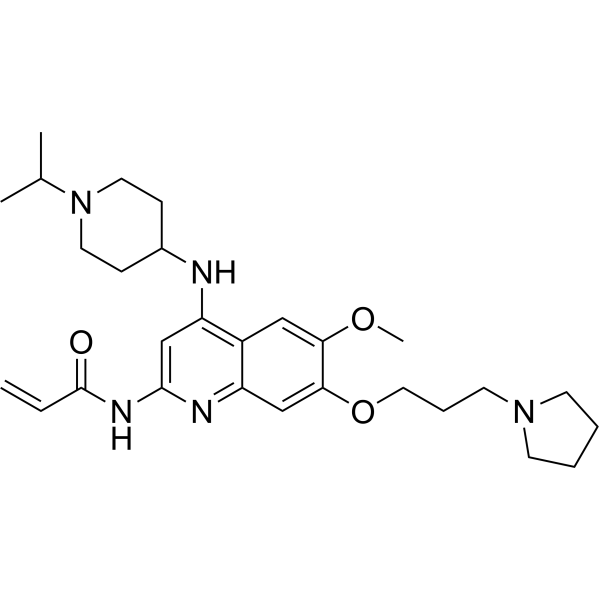
- HY-12688
-
|
|
Endogenous Metabolite
Reactive Oxygen Species
|
Neurological Disease
|
|
Succinyl phosphonate is an α-ketoglutarate dehydrogenase (KGDHC) inhibitor, effective inhibits (KGDHC) in muscle, bacterial, brain, and cultured human fibroblasts . Succinyl phosphonate trisodium salt is an 2-oxoglutarate dehydrogenase (OGDH) inhibitor, impairs viability of cancer cells in a cell-specific metabolism-dependent manner . Succinyl phosphonate trisodium salt inhibits the glutamate-induced ROS production in glutamate-stimulated hippocampal neurons in situ .
|
-
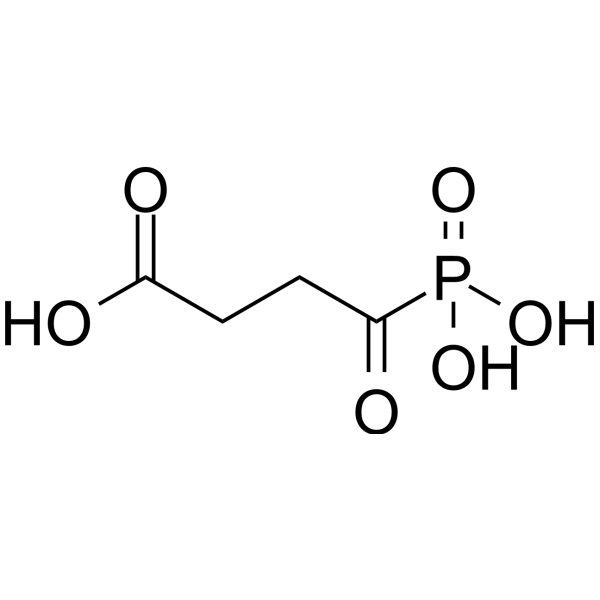
- HY-12688A
-
|
|
Endogenous Metabolite
Reactive Oxygen Species
|
Neurological Disease
Metabolic Disease
Cancer
|
|
Succinyl phosphonate trisodium salt is an α-ketoglutarate dehydrogenase (KGDHC) inhibitor, effective inhibits (KGDHC) in muscle, bacterial, brain, and cultured human fibroblasts . Succinyl phosphonate trisodium salt is an 2-oxoglutarate dehydrogenase (OGDH) inhibitor, impairs viability of cancer cells in a cell-specific metabolism-dependent manner . Succinyl phosphonate trisodium salt inhibits the glutamate-induced ROS production in glutamate-stimulated hippocampal neurons in situ .
|
-
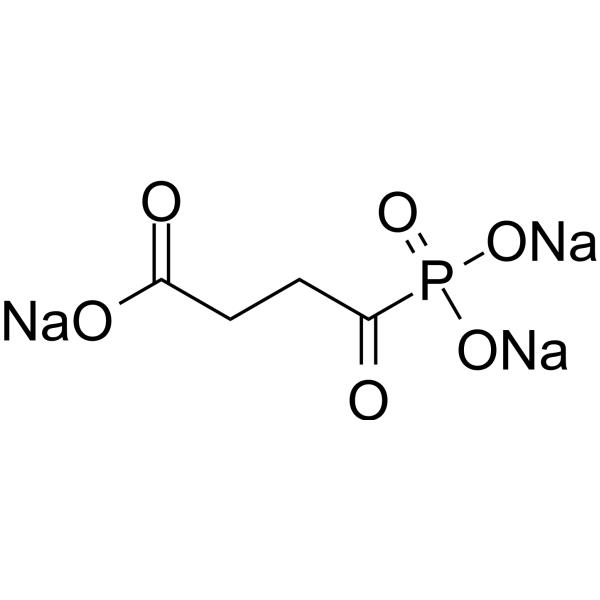
- HY-17363S1
-
|
|
Autophagy
HIV
Keap1-Nrf2
Endogenous Metabolite
Reactive Oxygen Species
|
|
|
Dimethyl fumarate-d2 is the deuterium labeled Dimethyl fumarate[1]. Dimethyl fumarate (DMF) is an orally active and brain-penetrant Nrf2 activator and induces upregulation of antioxidant gene expression. Dimethyl fumarate induces necroptosis in colon cancer cells through GSH depletion/ROS increase/MAPKs activation pathway, and also induces cell autophagy. Dimethyl fumarate can be used for multiple sclerosis research[2][3].
|
-
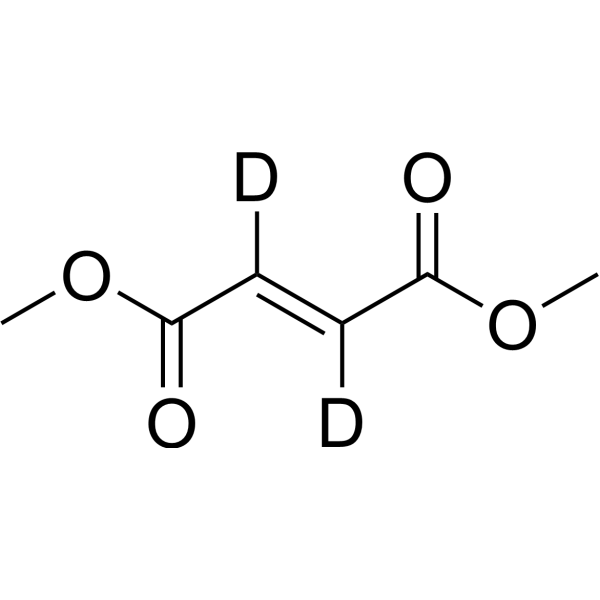
- HY-114759
-
|
|
Cytochrome P450
|
Neurological Disease
Metabolic Disease
Cancer
|
|
MS-PPOH is a potent and selective cytochrome P450 (CYP) epoxygenase inhibitor . MS-PPOH inhibits CYP2C8 and CYP2C9 with IC50s of 15 and 11 μM, respectively . MS-PPOH is a click chemistry reagent, it contains an Alkyne group and can undergo copper-catalyzed azide-alkyne cycloaddition (CuAAc) with molecules containing Azide groups.
|
-
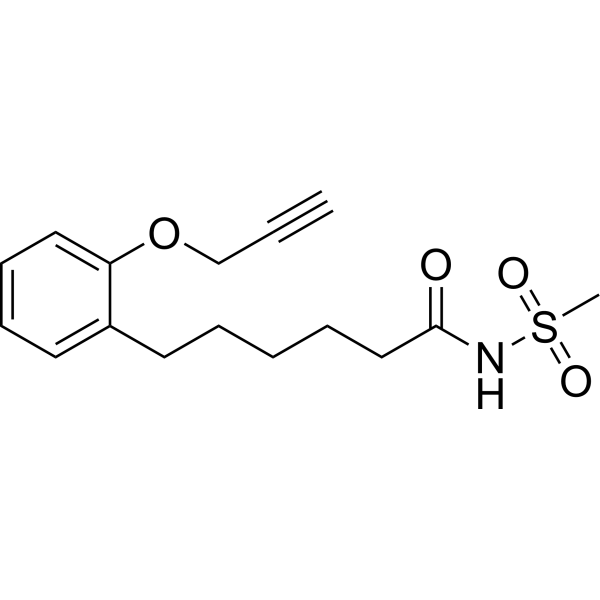
- HY-149696
-
|
|
NF-κB
|
Cancer
|
|
IR-Crizotinib is a NF-κB-inducing kinase (NIK) inhibitor that crosses the blood-brain barrier and fluorescently localizes intracranial glioblastoma (GBM) in mice (IC50=3.381 μM). IR-Crizotinib is conjugated from the near-infrared dye IR-786 and the NF-κB-inducing kinase (NIK) inhibitor Crizotinib. IR-Crizotinib can effectively inhibit the growth and invasion of glioma in vitro and in vivo and can be used in cancer research .
|
-
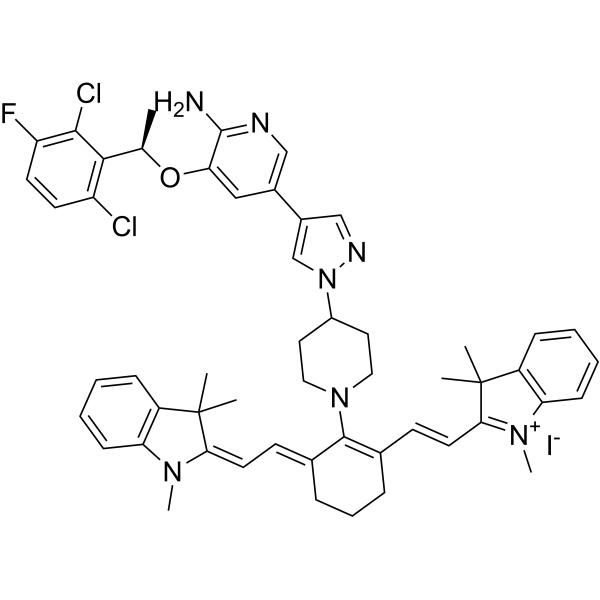
- HY-158115
-
|
|
Molecular Glues
Raf
MEK
|
Cancer
|
|
NST-628 is a brain-permeable MAPK pathway molecule glue that inhibits RAF phosphorylation and MEK activation. NST-628 also binds RAF and prevents the formation of BRAF-CRAF and BRAF-ARAF heterodimers, effectively inhibiting the RAS-MAPK pathway. NST-628 inhibits RAS- and RAF-driven cancers and demonstrated potent inhibition in mutant KRAS, NRAS, BRAF class II/III, and NF1-mutant tumors .
|
-
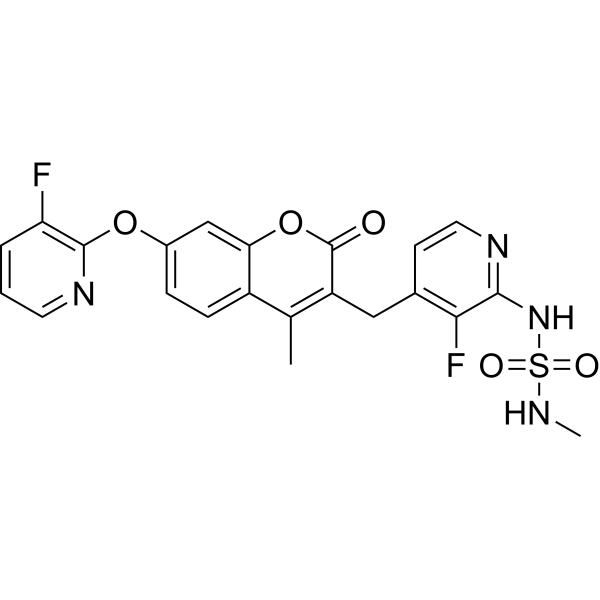
- HY-146524
-
|
|
Trk Receptor
|
Cancer
|
|
TRK-IN-18 is a potent inhibitor of TRK. Tropomyosin-related kinases (Trks) are a family of receptor tyrosine kinases activated by neurotrophins, a group of soluble growth factors including Nerve Growth Factor (NGF), Brain-Derived Neurotrophic Factor (BDNF) and Neurotrophin-3 (NT-3) and Neurotrophin-4/5 (NT-4/5). TRK-IN-18 has the potential for the research of cancer diseases (extracted from patent WO2021148805A1, compound 7) .
|
-
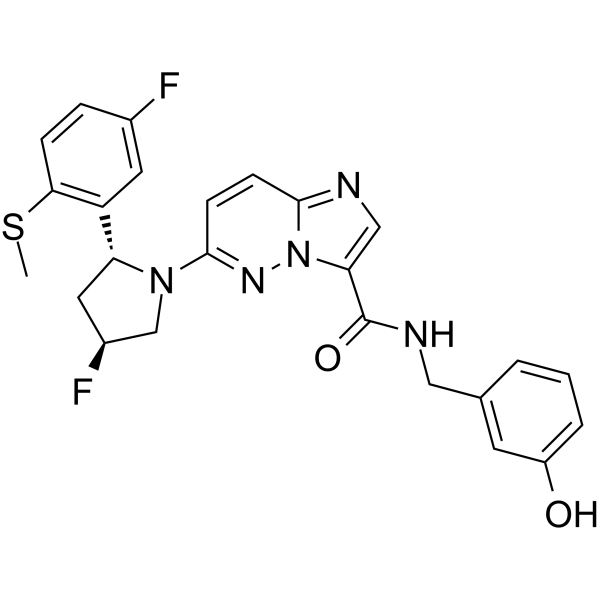
- HY-146523
-
|
|
Trk Receptor
|
Cancer
|
|
TRK-IN-17 is a potent inhibitor of TRK. Tropomyosin-related kinases (Trks) are a family of receptor tyrosine kinases activated by neurotrophins, a group of soluble growth factors including Nerve Growth Factor (NGF), Brain-Derived Neurotrophic Factor (BDNF) and Neurotrophin-3 (NT-3) and Neurotrophin-4/5 (NT-4/5). TRK-IN-17 has the potential for the research of cancer diseases (extracted from patent WO2021148807A1, compound 3) .
|
-
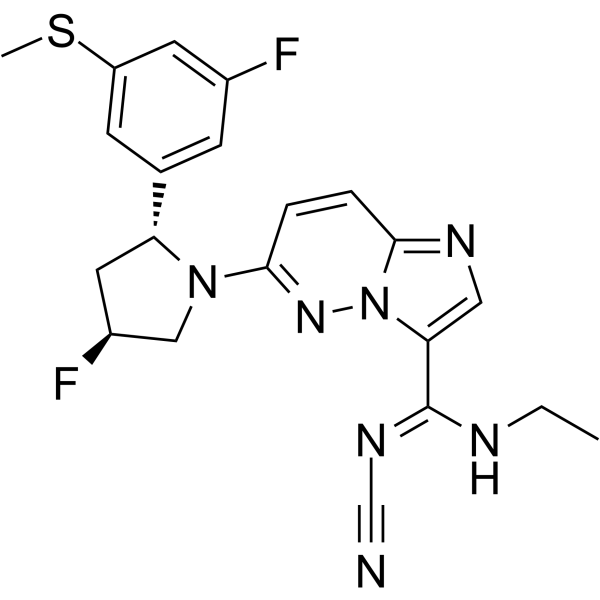
- HY-149695
-
|
|
EGFR
|
Cancer
|
|
EGFR-IN-91 (compound 9) is an orally available EGFR inhibitor with blood-brain barrier penetrability. EGFR-IN-91 inhibits EGFR L858R/C797S and EGFR exon 19del/C797S, inducing tumor regression in xenograft (PDX) mouse models. EGFR-IN-91 has the potential to inhibit localized and metastatic non-small cell lung cancer (NSCLC) driven by EGFR mutants .
|
-
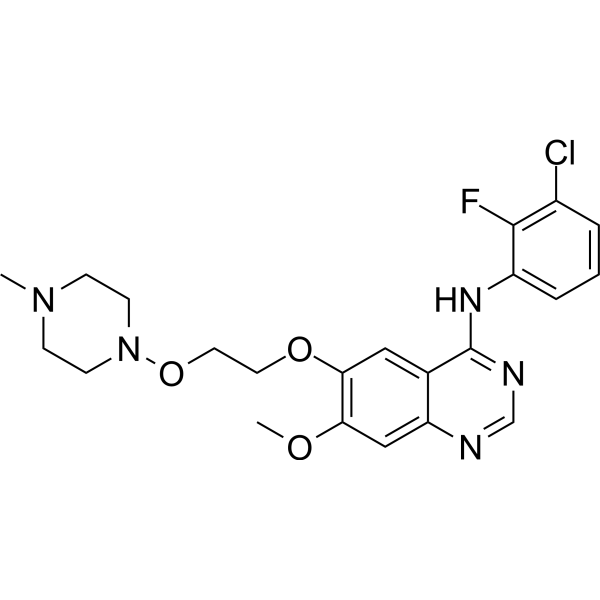
- HY-135046
-
|
|
Others
|
Neurological Disease
Inflammation/Immunology
Cancer
|
|
MTOB sodium is a potent C-terminal binding protein (CtBP) inhibitor. MTOB sodium attenuates repetitive head injury-elicited neurologic dysfunction and neuroinflammation via inhibition of the transactivation activity of CtBP1 and CtBP2. MTOB sodium antagonizes the transcriptional regulatory activity of CtBP1 and CtBP2 by eviction from their target promoters in breast cancer cell lines .
|
-
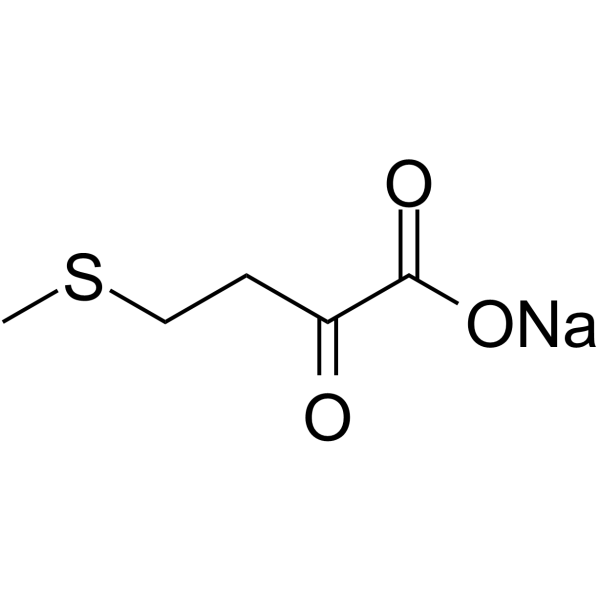
- HY-124582
-
|
|
Autophagy
mTOR
|
Cancer
|
|
NEO214 is an autophagy inhibitor and a covalent conjugate of the PDE4 inhibitor Rolipram (HY-16900) and perillyl alcohol (HY-N7000). It has anti-cancer activity and blood-brain barrier (BBB) permeability. Over sex. NEO214 prevents autophagy-lysosome fusion, thereby blocking autophagic flux and triggering glioma cell death. The process involves mTOR activation, andTFEB(Transcription Factor EB) aggregation. NEO214 inhibitionMacroautophagy/autophagy in glioblastoma cells has the potential to overcome chemotherapy resistance in glioblastoma .
|
-
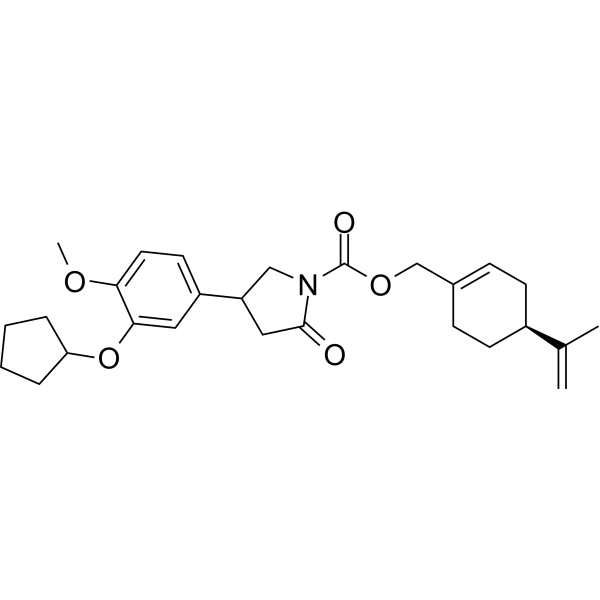
- HY-16637D
-
|
Vitamin B9 disodium; Vitamin M disodium
|
Endogenous Metabolite
|
Others
Neurological Disease
Cancer
|
|
Folic acid disodium (Vitamin B9 disodium; Vitamin M disodium) is an orally active disodium salt form of Folic acid (HY-16637) with an intrinsic dissolution rate (IDR) of 4.96·10 5 g/s . Folic acid disodium serves as cofactor in single-carbon transfer reactions and exhibits protective effects against neural tube defects, ischemic events, and cancer. Folate acid disodium overload leads to impaired brain development in embryogenesis and promotes growth of precancerous altered cells. Folic acid deficiency leads to megaloblastic anemia .
|
-
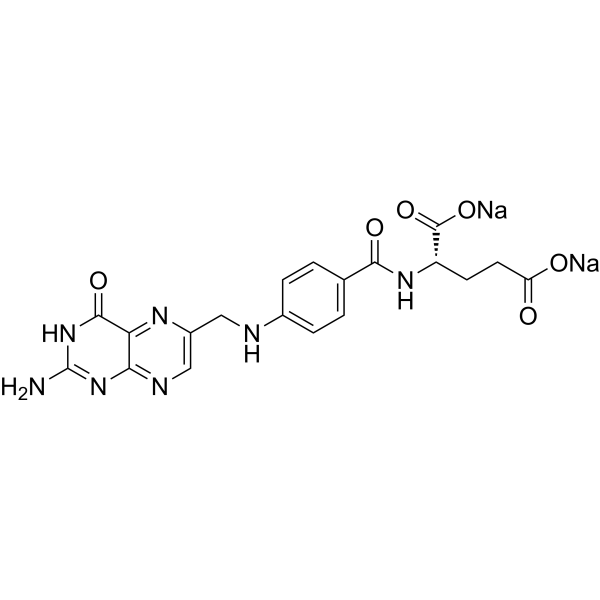
- HY-133551
-
|
|
RET
|
Cancer
|
|
WF-47-JS03 is a potent and selective RET kinase inhibitor with IC50s of 1.7 nM and 5.3 nM for KIF5B-RET transfected Ba/F3 cells and CCDC6-RET transfected LC-2/ad lung cancer cells, respectively. WF-47-JS03 demonstrates >500-fold selectivity against kinase insert domain receptor (KDR). Effective brain penetration .
|
-
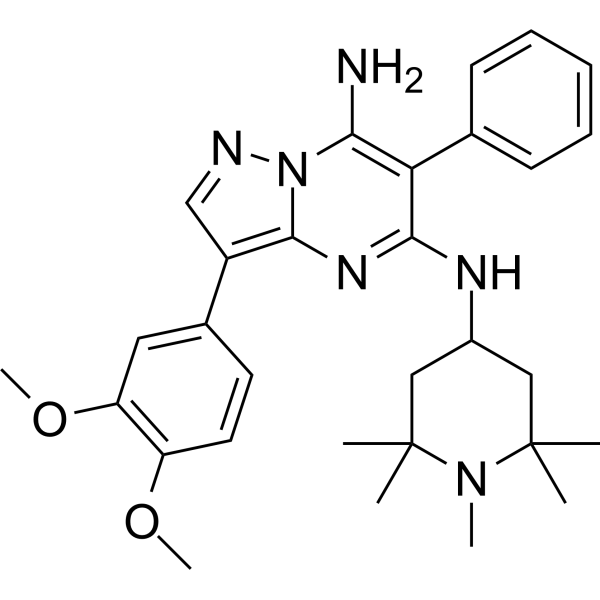
- HY-113916
-
|
AT13387 lactate
|
HSP
|
Cancer
|
|
Onalespib lactate is a potent and cross the blood-brain barrier heat-shock-protein-90 (Hsp90) inhibitor with an Kd value of 0.71 nM. Onalespib lactate inhibits the proliferation, survival and migration. Onalespib lactate decreases the expression of EGFR, p-EGFR, AKT, P-AKT, ERK1/2, P-ERK1/2, S6, P-S6 protein. Onalespib lactate shows antitumor activity. Onalespib lactate has the potential for the research of non-small cell lung cancer (NSCLC) .
|
-
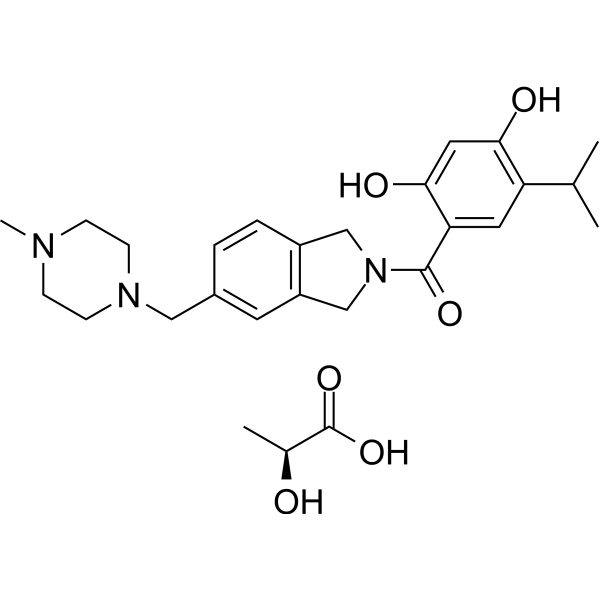
- HY-130495
-
|
CDDO-Trifluoethyl amide; RTA 404; TP-500
|
Keap1-Nrf2
Apoptosis
|
Cancer
|
|
CDDO-TFEA (RTA 404; TP-500) is a trifluoroacetamide derivative of CDDO with enhanced ability to cross the blood-brain barrier. CDDO is an Nrf2 activator that inhibits proliferation and induces differentiation and apoptosis in various cancer cells. CDDO-TFEA can enhance Nrf2 expression and signaling in various neurodegenerative disease models, including those mimicking multiple sclerosis, amyotrophic lateral sclerosis, and Huntington's disease. CDDO-TFEA induces apoptosis and blocks colony formation in Ewing's sarcoma and neuroblastoma cell lines with IC50 values ranging from 85-170 nM.
|
-

- HY-111373
-
|
|
mTOR
Autophagy
|
Cancer
|
|
RapaLink-1, the third-generation bivalent mTOR inhibitor, combines Rapamycin (HY-10219) with MLN0128 (HY-13328, a second-generation mTOR kinase inhibitor) by an inert chemical linker. RapaLink-1 shows better efficacy than Rapamycin or mTOR kinase inhibitors (TORKi), potently blocking cancer-derived, activating mutants of mTOR. RapaLink-1 can cross the blood-brain barrier. RapaLink-1 binding to FKBP12 results in targeted and durable inhibition of mTORC1. RapaLink-1 plays an antithrombotic role in antiphospholipid syndrome by improving autophagy. Anticancer activity .
|
-
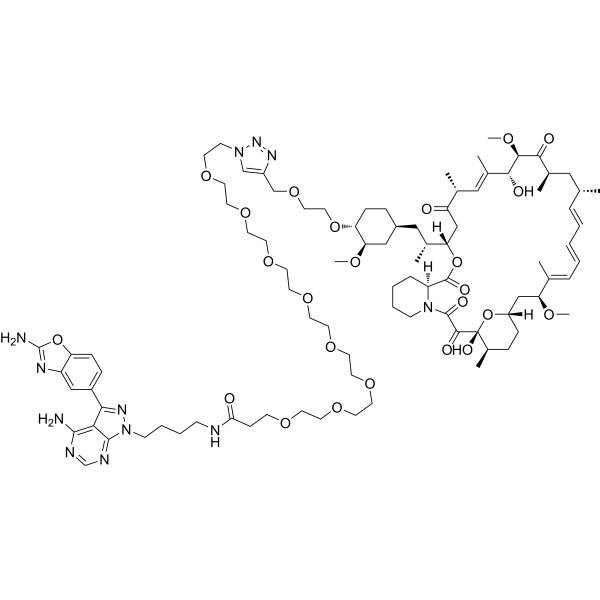
- HY-12678S1
-
|
NMS-E628-d8; RXDX-101-d8
|
Isotope-Labeled Compounds
Autophagy
Anaplastic lymphoma kinase (ALK)
Trk Receptor
ROS Kinase
|
Cancer
|
|
Entrectinib-d8 (NMS-E628-d8; RXDX-101-d8) is a deuterated version of Entrectinib (HY-12678). Entrectinib (NMS-E628) is an orally available, blood-brain barrier permeable, central nervous system active TrkA/B/C, ROS1 and ALK inhibitor with IC50 values of 1, 3, 5, 12 and 12, respectively. 7 nM. Entrectinib induces apoptosis and cycle arrest in cancer cells, has anti-tumor activity, and also alleviates bleomycin-induced pulmonary fibrosis in mice .
|
-
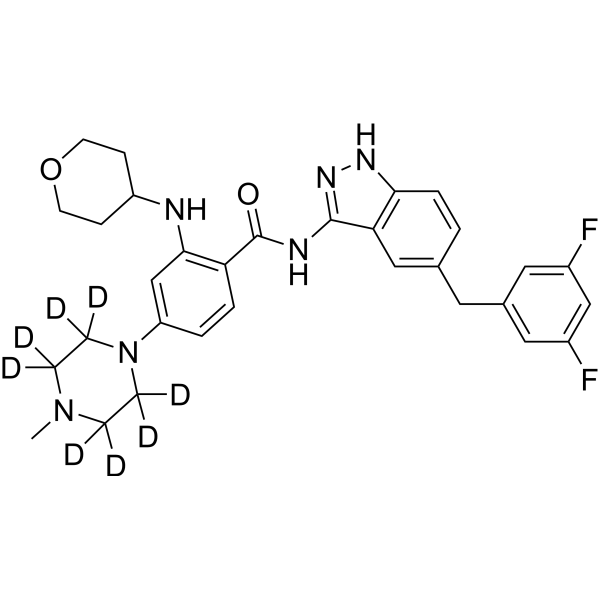
- HY-N2037A
-
|
Norcoclaurine hydrochloride
|
MDM-2/p53
ROS Kinase
Apoptosis
|
Infection
Cardiovascular Disease
Endocrinology
Cancer
|
|
Higenamine hydrochloride is a selective LSD1 inhibitor (IC50=1.47 μM) that can be isolated from aconite. Higenamine hydrochloride has anti-inflammatory and antibacterial activity. Higenamine (Norcoclaurine) can attenuate IL-1β-induced Apoptosis through ROS-mediated PI3K/Akt signaling pathway. Higenamine hydrochloride protects brain cells from oxygen deprivation. Higenamine can promote bone formation in osteoporosis through the SMAD2/3 pathway. Higenamine hydrochloride can be used to study cancer, inflammation, cardiorenal syndrome and other diseases .
|
-
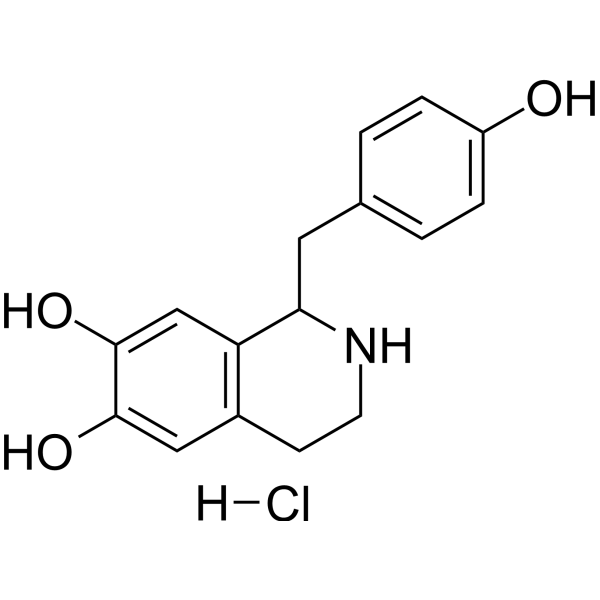
- HY-138185
-
|
SF 2738A
|
Bacterial
|
Infection
|
|
Collismycin A is a bacterial metabolite originally isolated from Streptomyces that has diverse biological activities, including antibacterial, antiproliferative, and neuroprotective properties. It is active against a variety of bacteria (MICs=6.25 and 100 μg/mL) and fungi (MICs=12.5-100 μg/mL). It inhibits proliferation of A549 lung, HCT116 colon, and HeLa cervical cancer cells (IC50s=0.3, 0.6, and 0.3 μM, respectively) and NIH373 fibroblasts (IC50=56.6 μM) but not MDA-MD-231 breast cancer cells (IC50=>100 μM). Collismycin A forms a complex with Fe(II) and Fe(III) at a 2:1 ratio, and the addition of iron ions inhibits the antiproliferative effect of collismycin A on HeLa cells, an effect that does not occur with the addition of zinc, manganese, copper, or magnesium ions.3 Collismycin A (1 μM) prevents apoptosis in the brain region of zebrafish larvae by 44% in a model of neuronal cell death induced by all-trans retinoic acid.
|
-

-
-
HY-L155
-
|
|
477 compounds
|
|
Mitochondria, as the main place of energy supply in life, is essential to maintain normal life activities. Mitochondrial dysfunction is associated with common diseases, such as cardiovascular diseases, neurodegenerative diseases, diabetes and cancer. The heart, brain and liver rely heavily on mitochondrial function as the main organs for drug metabolism. In addition, mitochondria is also a target of many drugs, some of which induce organotoxicity by inducing mitochondrial toxicity.
MCE contains 477 mitochondrial toxic compounds, which can be used as tool compounds for drug development and disease mechanism research.
|
-
-
HY-L043
-
|
|
1,385 compounds
|
|
Lipids are a diverse and ubiquitous group of compounds which have many key biological functions, such as acting as structural components of cell membranes, serving as energy storage sources and participating in signaling pathways. Several studies suggest that bioactive lipids have effects on the treatment of some mental illnesses and metabolic syndrome. For example, DHA and EPA are important for monoaminergic neurotransmission, brain development and synaptic functioning, and are also correlated with a reduced risk of cancer and cardiovascular disease in clinical and animal studies.
MCE supplies a unique collection of 1,385 lipid and lipid derivative related compounds including triglycerides, phospholipids, sphingolipids, steroids and their structural analogues or derivatives. MCE lipid compound library can be used for research in bioactive lipids, and high throughput screening (HTS) and high content screening (HCS).
|
| Cat. No. |
Product Name |
Type |
-
- HY-149696
-
|
|
Dyes
|
|
IR-Crizotinib is a NF-κB-inducing kinase (NIK) inhibitor that crosses the blood-brain barrier and fluorescently localizes intracranial glioblastoma (GBM) in mice (IC50=3.381 μM). IR-Crizotinib is conjugated from the near-infrared dye IR-786 and the NF-κB-inducing kinase (NIK) inhibitor Crizotinib. IR-Crizotinib can effectively inhibit the growth and invasion of glioma in vitro and in vivo and can be used in cancer research .
|
| Cat. No. |
Product Name |
Target |
Research Area |
-
- HY-P2341
-
|
|
Peptides
|
Cancer
|
|
Angiopep-2 hydrochloride is a brain peptide vector. The conjugation of anticancer agents with the Angiopep-2 peptide vector could increase their efficacy in the treatment of brain cancer .
|
-
- HY-P1351
-
|
|
Peptides
|
Cancer
|
|
Angiopep-2-cys is a conjugate of Angiopep-2 hydrochloride (HY-P2341) and cysteine. Angiopep-2 hydrochloride is a brain peptide vector. The conjugation of anticancer agents with the Angiopep-2 peptide vector could increase their efficacy in the treatment of brain cancer .
|
-
- HY-P4073
-
|
GRN1005; Paclitaxel trevatide
|
Peptides
|
Cancer
|
|
ANG1005 (Paclitaxel trevatide) is a brain-penetrating peptide-drug conjugate. ANG1005, a taxane derivative, consists of three paclitaxel (HY-B0015) molecules covalently linked to Angiopep-2, designed to cross the blood-brain and blood-cerebrospinal barriers and to penetrate malignant cells via low density lipoprotein receptor-related protein (LRP1) transport system .
|
-
- HY-P10255
-
|
|
Potassium Channel
|
Cancer
|
|
K90-114TAT is an inhibitor for EAG2-Kvβ2 interaction, and exhibits antitumor efficacy against glioblastomas .
|
| Cat. No. |
Product Name |
Target |
Research Area |
-
- HY-P99849
-
|
ABT-806
|
EGFR
|
Cancer
|
|
Depatuxizumab is a brain-penetrant and humanized tumor-specific anti EGFR monoclonal antibody. Depatuxizumab inhibits the growth of xenograft models of mutant EGFRvIII and wild-type EGFR. Depatuxizumab can be used for research on cancer .
|
| Cat. No. |
Product Name |
Category |
Target |
Chemical Structure |
| Cat. No. |
Product Name |
Chemical Structure |
-
- HY-17412S1
-
|
|
|
Minocycline-d6 sulfate is deuterated labeled Minocycline (HY-17412A). Minocycline is an orally effective semi-synthetic tetracycline antibiotic and HIF-1α inhibitor that can penetrate the blood-brain barrier. Minocycline has bacteriostatic, anti-cancer, anti-inflammatory, neuroprotective properties and antidepressant effects.
|
-

-
- HY-17363S1
-
|
|
|
Dimethyl fumarate-d2 is the deuterium labeled Dimethyl fumarate[1]. Dimethyl fumarate (DMF) is an orally active and brain-penetrant Nrf2 activator and induces upregulation of antioxidant gene expression. Dimethyl fumarate induces necroptosis in colon cancer cells through GSH depletion/ROS increase/MAPKs activation pathway, and also induces cell autophagy. Dimethyl fumarate can be used for multiple sclerosis research[2][3].
|
-

-
- HY-12678S1
-
|
|
|
Entrectinib-d8 (NMS-E628-d8; RXDX-101-d8) is a deuterated version of Entrectinib (HY-12678). Entrectinib (NMS-E628) is an orally available, blood-brain barrier permeable, central nervous system active TrkA/B/C, ROS1 and ALK inhibitor with IC50 values of 1, 3, 5, 12 and 12, respectively. 7 nM. Entrectinib induces apoptosis and cycle arrest in cancer cells, has anti-tumor activity, and also alleviates bleomycin-induced pulmonary fibrosis in mice .
|
-

| Cat. No. |
Product Name |
|
Classification |
-
- HY-139300A
-
|
HMPL-813 succinate
|
|
Alkynes
|
|
Epitinib succinate is an orally active and selective epidermal growth factor receptor tyrosine kinase inhibitor (EGFR-TKI) designed for optimal brain penetration. Epitinib succinate can be used for the research of cancer . Epitinib (succinate) is a click chemistry reagent, it contains an Alkyne group and can undergo copper-catalyzed azide-alkyne cycloaddition (CuAAc) with molecules containing Azide groups.
|
-
- HY-114759
-
|
|
|
Alkynes
|
|
MS-PPOH is a potent and selective cytochrome P450 (CYP) epoxygenase inhibitor . MS-PPOH inhibits CYP2C8 and CYP2C9 with IC50s of 15 and 11 μM, respectively . MS-PPOH is a click chemistry reagent, it contains an Alkyne group and can undergo copper-catalyzed azide-alkyne cycloaddition (CuAAc) with molecules containing Azide groups.
|
-
- HY-139300
-
|
HMPL-813
|
|
Alkynes
|
|
Epitinib is an orally active and selective epidermal growth factor receptor tyrosine kinase inhibitor (EGFR-TKI) designed for optimal brain penetration. Epitinib can be used for the research of cancer . Epitinib is a click chemistry reagent, it contains an Alkyne group and can undergo copper-catalyzed azide-alkyne cycloaddition (CuAAc) with molecules containing Azide groups.
|
Your information is safe with us. * Required Fields.
Inquiry Information
- Product Name:
- Cat. No.:
- Quantity:
- MCE Japan Authorized Agent:


























































































